Shadow Education


7



7
11
YOUTH HONG KONG published quarterly
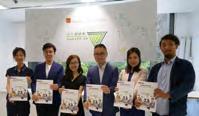
by The Hong Kong Federation of Youth Groups
EDITORIAL BOARD
Andy Ho (Chair)
Lakshmi Jacota (Vice Chair)
Ada Chau (Managing Editor)
Gwen Sin (Senior Editor)
Hsu Siu-man
Miranda Wong
Christa Cheung
Winky Ang
Miranda Ho
CIRCULATION (unaudited)
9,000 in Hong Kong, throughout the region and overseas

VIEWS EXPRESSED are the authors’ and interviewees’, may come from official sources, and do not necessarily reflect the views of the editorial board or publisher


REPRODUCTION OF CONTENTS without written permission from the publisher is prohibited
OVERVIEW
Lakshmi Jacota
SECTIONS & TRANSLATION
Gwen Sin, Ada Chau, Stella Chen and CPS team
PHOTOGRAPHS
Gwen Sin, stock images or in public domain
TRADEMARKS All brand names and product names are registered trademarks. Youth Hong Kong is not associated with any product or vendor mentioned in articles.
ARTWORK & DESIGN
Roda Asia Ltd. & HKFYG
COVER DESIGN
Roda Asia Ltd.
LAYOUT & PRINTING DG3
ISSN 2071-3193 (Print)
ISSN 2519-1098 (Online)


WEB youthhongkong.hkfyg.org.hk
CORRESPONDENCE to The Editor, Youth Hong Kong, 21/F, The Hong Kong Federation of Youth Groups Building, 21 Pak Fuk Road, North Point, Hong Kong
TEL 3755 7108
FAX 3755 7155
EMAIL youthhongkong@hkfyg.org.hk
ADVERTISING ENQUIRIES
Ada Chau 3755 7108
The Hong Kong Federation of Youth Groups was founded in 1960 and is the city’s largest youth service organization. More than 25,000 activities are organized by over 80 units annually with attendance of nearly 6 million. Services Camps, Leisure, Cultural and Sports Services, Counselling, Creativity education and STEM, Education and continuous learning, Employment and entrepreneurship, Exchange, Leadership training, M21 Multimedia, Parenting, Research and Publications, Volunteering, Youth at Risk, Youth SPOTs
WEB hkfyg.org.hk m21.hk
Online donations giving.hkfyg.org.hk
In places like Hong Kong, as well as in many other Asian countries, private tutoring has become so common place that it sometimes seems that those who do not have academic tutoring outside school, are in the minority.

However, the proliferation of tutoring is gaining traction around the world. Whether it is ensuring that children maintain a competitive edge in their studies, are able to secure good examination results and then get entry into universities; or peer pressure felt by students, their parents or both; or even assisting slow learners keep up and helping others better understand their curriculum, the reasons for what some refer to as ‘‘shadow education’’ are complex and varied.
This issue of Youth Hong Kong looks at private, after-school, tutoring in some depth from the perspective of those who experience its impact. We ask students, parents, tutors and teachers their opinions – pro and con – as well as talk to experts about the challenges and opportunities of this phenomenon.
We know that this is a topic of interest to many of our readers and we look forward to hearing what you might think about private tutoring, either through your personal experiences or as an observer.
Andy Ho Wing-cheong Executive Director, HKFYG June 2023Aroundthe world, private, after-school tutoring has become part of a widely adopted and accepted method of enhancing student academic performance. While the reasons may differ for students – and parents – to subscribe to tutoring, the goal is the same: to invest in the best educational outcome to get ahead. But is economic investment the only type of investment we should be looking at?
The economic implications and impact of private tutoring, by whatever name it might be called, including “shadow education” or “coaching” are well known. Whether delivered before or after school, beyond the school gates, in person or online, private tutoring has become a big business.

In a report1 published in January this year, it was estimated that the global private tutoring market would reach over US$ 290 billion by 2030, with an annual compound growth rate of around 5.1 per cent in Japan, 6.8 per cent in Canada and 8.4 per cent in Germany. India’s current market revenue for private after-school tutoring, meanwhile, is expected to reach over US$ 16 billion within five years, in 2028,2 while online tutoring services were estimated to grow by more than US$10.5 million between 2022 and 2027, at a growth rate of 17 per cent.3 Similar developments were predicated in China, according to a 2020 report by management
consulting firm Oliver Wyman,4 which estimated growth from around US$123.7 billion in 2019 to US$0.15 trillion by 2025. Comparable trends have been found in other geographical markets, including in other Asian countries, Europe, North America and on the African continent.
The common factor amidst these figures is the extent to which parents in particular are willing to invest in their children’s education which is seen as a crucial stepping stone for future development and success. Therefore, to make sure that their children might not lose out in any form of competition – be it entry to a specific school, including kindergarten or university, staying afloat with classwork, excelling at exams, or just succumbing to the ‘keeping up with the Joneses’ syndrome – parents are willing to use whatever resources they can afford to invest in education, and if necessary, do that through private tutoring.
Theglobal private tutoring market is estimated to reach over US$290 billion by 2030.
But what about investment beyond the monetary?
Private tutoring also requires an investment in time, which then has consequences to ensure that wellbeing is safeguarded. What follows is not a judgment or criticism of tutoring per se; instead, it attempts to put the “cost” of private tutoring into a wider context, which might be factors to reflect upon when considering the investment required for shadow education.
Private tutoring is generally understood to go beyond normal school hours. This means that a child who goes to school has either attended, or needs to attend, another class (or classes) online, individually or in groups to repeat the classwork to consolidate learning; get further explanations to understand what is being taught; or acquire additional learning to keep one step ahead of the curve.
Astudent in Hong Kong can average a weekly study time of about 50 hours for a five-day week; whereas adults work an average of 44 hours a week.
in the last five years, standing in stark contrast to the majority of Hong Kong people surveyed in a 2022 poll saying that they worked on average 44 hours a week.7
The troubling fact about the number of hours spent in private tutoring, is that it does not include other extra-curricular activities a child might be involved in, particularly, sports, music and art.
In July 2021, Mainland Chinese policy makers introduced sweeping reforms to the after-school tutoring industry, effectively banning for-profit companies offering tuition services on school curriculum subjects during the weekend, on holidays or after 9:00 p.m. on weekdays. Tutoring would only be allowed on the weekend and within a limited number of hours. The purpose, according to the State Council statement, was to reduce the burden on students from homework, while also easing the financial pressures on families. This was described as the “double reduction.”8
This change, while upsetting some parents who believed that their children would fall behind as a result of less tutoring, was seen as something positive by the young protagonists themselves.
As one nine-year-old clearly stated, “[My extra] English class used to take three hours. Now I can spend time with my friends and family instead. I am so happy that I can go to amusement parks more often!”9
If the time spent in after-school tutoring raise concerns, what are the implications for overall well-being?
All this learning takes up time. As a former Minister of Education in Mauritius once observed, “children spend an average of nine hours a day in regular [school] and additional tutoring, while adults have a seven-hour standard working day.”5
A similar observation was made by the Legislative Council of Hong Kong in a 2018 report. It stated that the average study time for a student in primary to secondary education, accounting for class time, homework and afterschool tutoring averaged to “about ten hours on a school day”, or 50 hours for a five-day week. This could rise substantially if including weekends.6 With only anecdotal confirmation, it is believed that these figures have increased
A 2020 study10 in Korea noted that there was a causational link between emotional distress and tutoring, which resulted in a disturbed night’s sleep. The authors suggested that policy makers stress age-appropriate sleep durations, while also looking for balanced strategies “between … the effect of private education on academic achievement and the need to guarantee physical and mental health in adolescent students.”
In a Hong Kong study, students talked about the pressure they felt when tutoring did not match their own or, more importantly, their parents’ expectations. The worry to not upset those around them played upon their mental health. Also quoted in this study, a Sri Lankan scholar noted that “The age-appropriate developmental
tasks such as building wholesome attitudes towards oneself, learning to get along with peers, developing conscience, morality and a scale of values [stood] a very poor chance …”11 as a result of private tutoring.
The caution then is that without time for leisure activities or just “free time”, and if children are too exhausted at the end of the day, they are missing out on opportunities to explore their own interests, learn how to release tension, forge healthy social relationships or even build resilience.
Achieving academic excellence, with or without the investment into tutoring, has been the focus of a lot of research and study. The amount of pressure to succeed, along with the concomitant issues of fatigue, stress and

imbalances in wellbeing that some students feel by having to attend extra tutoring, should not be dismissed out of hand.
After-school tutoring is a complex subject, supported by many people for many reasons. Whatever the motive to send a student for tutoring, it really is imperative for parents, along with educators and perhaps even policy makers, to consider the total investment into this phenomenon, not just financially, sometimes beyond the resource capabilities of parents themselves.
Student wellbeing must be safeguarded within the entire educational framework, irrespective of the acquisition or reasons for tutoring. At the end of the day, academic results will not be worth more than balanced mental, emotional, psychological and physical health. And surely that is where the investment into our children’s future should be.
References:
1. https://www.reportlinker.com/p0552740/Private-Tutoring-Industry.html?utm_source=GNW
2. https://thepint.in/feature/indias-tuition-republic-is-bigger-than-ever-coaching-culture-is-an-epidemicnow/1270638/
3. https://www.technavio.com/report/online-tutoring-services-market-in-india-industry-analysis?utm_ source=prnewswire&utm_medium=pressrelease&utm_campaign=T41_report_ wk14_2023_004&utm_content=IRTNTR71982
4. https://varsity.com.cuhk.edu.hk/index.php/2021/11/less-tutoring-more-anxiety/
5. https://web.edu.hku.hk/f/staff/376/Shadow_Education_System.pdf
6. At https://www.legco.gov.hk/research-publications/english/1718in05-overall-study-hours-andstudent-well-being-in-hong-kong-20180130-e.pdf
7. https://www.thestandard.com.hk/breaking-news/section/4/189611/35pc-HK-employees-are-on-thejob-an-average-of-50-hours-per-week,-study-shows
8. https://www.gov.cn/zhengce/2021-07/24/content_5627132.htm
9. https://varsity.com.cuhk.edu.hk/index.php/2021/11/less-tutoring-more-anxiety/
10. https://pubmed.ncbi.nlm.nih.gov/33142769/
11. https://unesdoc.unesco.org/ark:/48223/pf0000133039/PDF/133039eng.pdf.multi

• Whether as a means to offer additional support or advantage, the aim is still academic achievement
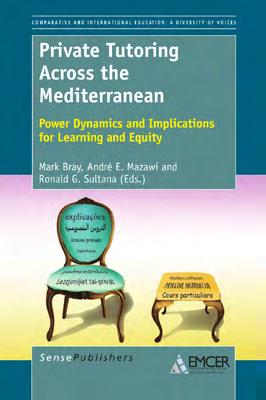
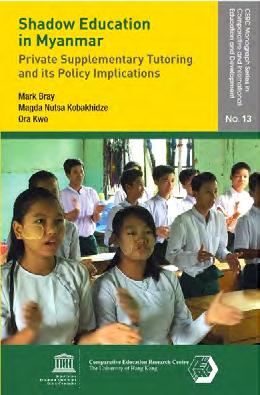
• Finding a balance that does not add to the stress levels of students should always be a priority for parents and teachers.
Can you explain what you mean by ‘‘shadow education’’?
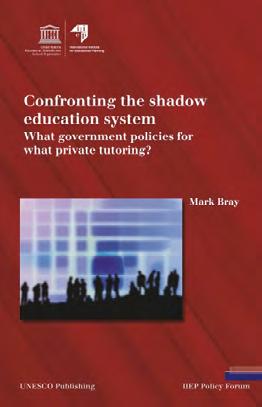
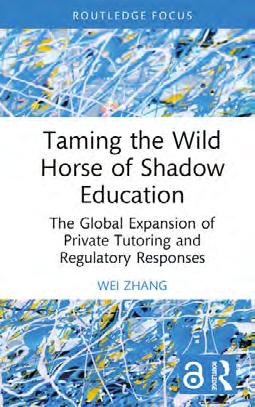

Shadow education is a metaphorical term for educational activities that operate outside of the formal education system. Tutoring, for example, often “shadows” the curriculum of mainstream schools, but may also cover materials that go beyond, or differ, from that taught in schools. While the term is widely used in academic literature, teachers, parents and students are unlikely to refer to tutoring activities in everyday life as “shadow education”.
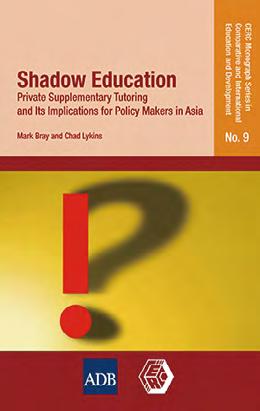
The tutoring activities that comprise shadow education have distinct names and take different forms around the world. In Japan for instance, it is known as juku. In South Korea, afterschool programmes are known as hakwon, and in Taiwan, buxiban. In Greece, tutoring is referred
• 無論是作為學校以外的學業支援,學生補習或是一 種優勢,共最大目的終歸是追求學習成績上的進步。
• 家長和教師必須尋找一個平衡點避免因此而加重 學生壓力。
to as parapedia. In Russia and throughout the former Soviet Union repetitorstvo denotes private tutoring, and a private tutor is called a repetitor. In countries where English is more commonly used, such as Pakistan, India, and Singapore, the term private tuition is often used.
So, is this a phenomenon that has no geographical limitations?
Once considered an East Asian phenomenon, research from Europe, Africa, and North America indicates that private tutoring has become prevalent in these regions. It is also becoming increasingly popular in Scandinavian countries, even though governments in these countries discourage excessive competitiveness and promote equal opportunities for all students through well-funded public education systems. Here, private tutoring is still an attractive option for those seeking additional support and personalised attention.
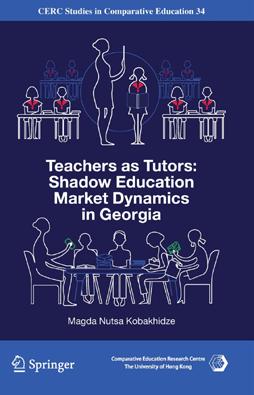
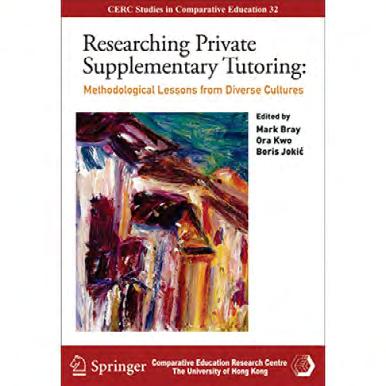
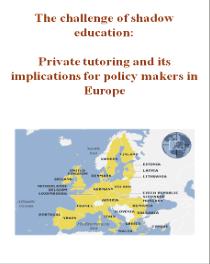
Private, supplementary tutoring outside the formal education system – or what Dr Nutsa Kobakhidze calls “Shadow Education” – has become a global phenomenon.
In Hong Kong, shadow education has a long history and takes distinct forms that are unique to us. The ‘star tutors’ employed by large tutorial companies and featured in stylish attire on billboards, trams, and buses are an example of this. Video classes are available, where students can receive help from teaching assistants. This tutoring is aimed at students facing intensively competitive end-ofsecondary-school examinations and is focused on analysis of question types and understanding marking schemes.
Tutoring in Hong Kong is also prevalent in young children, which has become a cause for concern. Some families seek tutoring for their children to give them an early advantage in education and a head start in life, and to gain admission to good primary and secondary schools, even to gain admission into kindergartens and playgroups. A very recently published paper on tutoring for kindergarten admissions explains this in more detail.1
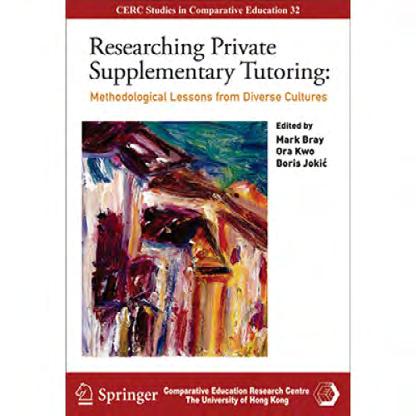
Is it fair to say that the tendency for schools to focus primarily on examination scores, PISA rankings, and other assessment tools has led to its proliferation?
In countries where high-stakes exams and standardised tests are common, such as Hong Kong, mainland China, Korea, Japan, and Singapore, private tutoring services are in high demand as families seek additional academic support. These countries have highly competitive education systems, and admission to prestigious universities depends on exam scores.
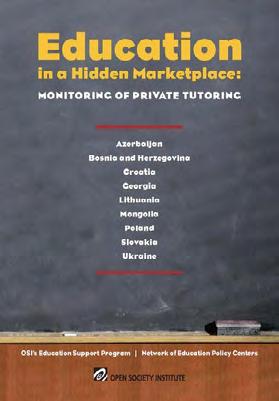

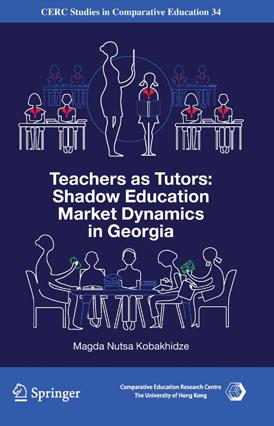
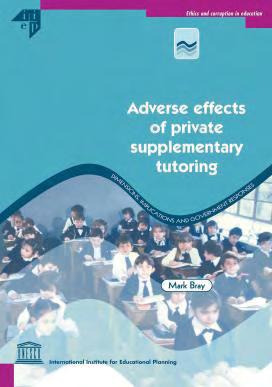
While these countries tend to rank highly in PISA rankings, achieving this is primarily a governmental goal. For students and families seeking tutoring services, the main motivations are to increase confidence, keep up with peers, improve academic achievement and get good marks.
Do you think shadow education exacerbates the ‘commercialisation’ of education, potentially widening the gulf between those who can and those who cannot access it?
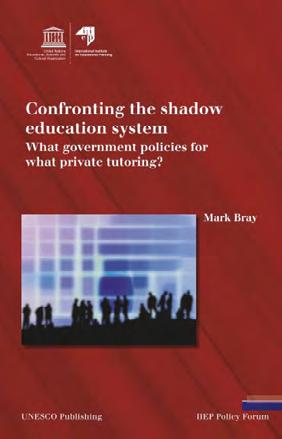
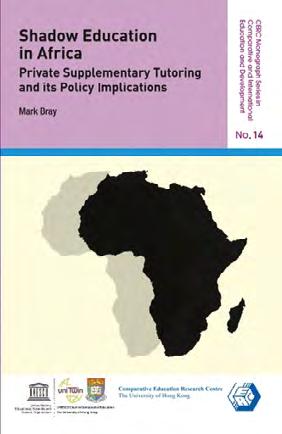

A frequently discussed issue relating to shadow education is its potential for exacerbating social inequality, since tutoring requires resources that poor families do not have. The marketisation of education and wider neoliberal policies have allowed shadow education businesses to flourish, and education is increasingly viewed as a commodity and instrument to achieve goals. As a result, social competition intensifies pressures, and the market benefits from the anxieties of students and their parents.
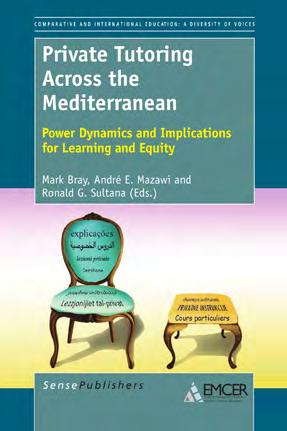
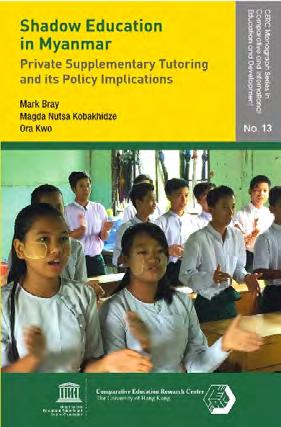
The main motivations for tutoring services are to achieve good marks, increase confidence, keep up with peers, and improve academic achievement.
However, not all tutoring is commercial. We also see organisations, community bodies, and even individual teachers providing discounted or free tutoring to students from disadvantaged families. In some cases, tutoring can be seen as an instrument for equalising educational opportunities for underprivileged students.
Shadow education can provide additional academic support, but it can also have negative effects on the mental health and well-being of students. Tutoring can be an extra burden because it creates an additional workload, limits time for play, and contributes to stress levels. Families and parents may also experience high levels of stress due to the high cost of tutoring, if they can afford it at all.
Looking forward, it is essential for both parents and students to recognise that academic success is not the sole predictor of future success. A well-rounded education that includes social and emotional learning, character development, and life skills is just as important for future success.
There is no consensus in research on the extent to which private tutoring contributes to students’ academic achievement. Its effectiveness is dependent on various factors, such as the motivation of students, the qualifications and professionalism of tutors, and the quality of tutoring they deliver. While tutoring may be beneficial for some students, it may not make a significant difference for others.


As an educator, what do you think about students pursuing shadow education?




Educators should work with parents and students to find a balance between academic achievement and overall well-being. This can involve encouraging students to take breaks, engage in extracurricular activities, and seek help when needed. Educators can work with parents to address the root causes of shadow education, such as highstakes testing and pressure to perform, and advocate for a more balanced and holistic approach to education.
What are your thoughts on whether supplementary tutoring undermines teachers' professionalism?
Tutoring does have implications for the teaching profession. In low-income countries, mainstream school teachers who also work as tutors may experience role conflict and exhaustion due to the increased workload. Teachers who tutor their own students outside of school hours may also be exposed to charges of favouritism and opportunities for corruption.


In places where school teachers don’t tend to provide tutoring, they may feel undervalued and constantly compared unfavourably to tutors. For instance, in a study conducted in Hong Kong,2 some students expressed greater appreciation for their tutors than their school teachers. Such attitudes could undermine teacher professionalism, as could the ways in which tutoring centres often emphasise their superiority over schools through aggressive advertising and messaging.



On the other hand, tutoring can enhance teacher professionalism. For example, some teachers in Georgia feel that tutoring provides them with extra teaching opportunities and helps them to learn more in their field. Therefore, it is important to consider the context in which teaching and tutoring take place.

Tutoring can also be seen as an instrument for equalising educational opportunities for underprivileged students.
What developments do you see in the future?
I’m eager to observe how private tutoring evolves. During the pandemic, new types of tutors emerged, such as ‘Zutors’ (Zoom tutors), as well as microschools and parent-organised tutoring.


Currently, we are witnessing the impact of ChatGPT on tutoring businesses. As AI increasingly enters educational systems, it will be interesting to see how it transforms the learning process and how much room will remain for human tutors.
there had been a “significant spike” in student interest in ChatGPT, leading to a slowdown in Chegg's new customer growth rate and concomitant fall in share price.
Although the threat is real, it is unlikely that AI will completely replace human tutors. Human tutors can empathise with students, take into consideration their emotions, and provide more nuanced responses. They can also better motivate students by providing encouragement and feedback.
As ChatGPT and AI are relatively new phenomena, there is limited scholarly research available to understand their actual impact, especially in terms of direction and and magnitude. As research continues, we may gain a better understanding of how AI will shape the future of various industries, including education and tutoring businesses.

Could you expand on this a little more on AI and tutoring?
Tutoring businesses use AI in a variety of ways, including integrating chatbots that assist students through messaging apps, websites, or mobile apps. These chatbots can help reduce the workload of human tutors, allowing them to focus on more complex tasks.
AI can also create customised study plans and learning resources that are tailored to students’ individual needs, help students with problem-solving, and answer their questions. As technology continues to evolve, it is likely that AI tutoring tools will become even more sophisticated and more widely used in tutoring businesses.

AI also has the potential to disrupt the tutoring business. A recent news article, for example, reports the effects of the ChatGPT language model on online education company Chegg, which offers homework assistance and tutoring. CEO Dan Rosensweig said that since March of this year,
Dr Nutsa Kobakhidze is the Director of the Comparative Education Research Centre and also an Assistant Professor in Comparative and International Education at the Faculty of Education, the University of Hong Kong. She is also the programme coordinator for the M.Ed. in Comparative and Global Studies in Education and Development. Dr Nutsa's research interests include privatisation of education (focus on private tutoring), comparative and international education, teacher professionalism and identity, and methodologies of largescale international assessments (e.g. PISA) Dr Nutsa’s works have been published in well-regarded international journals and she is an author and co-author of books published in English and Georgian and translated into four other languages. She holds a Master’s degree in International Education Policy from Teachers College, Columbia University, USA and a PhD in Comparative Education from The University of Hong Kong.

2. https://link.springer.com/article/10.1007/s11125-015-9353-2





3. https://www.reuters.com/markets/us/edtech-chegg-slumps-revenue-warning-chatgpt-threatensgrowth-2023-05-02/

It is unlikely that AI will completely replace human tutors.
Private tutoring flourishes in Hong Kong. In a small sample survey conducted specifically for this issue, responses from 360 students, as well as a few parents, teachers and tutors were received.
• Our recent survey with students, parents, teachers and tutors reveals new data on private tutoring:


- Of the 72% of students who are still attending tutoring, reasons could vary from examination preparation; seeking clarity on difficult concepts and to fulfilling parental expectations.
- Parents interviewed shared mixed responses on why they sent their children for private tutoring.
- 90% of the teachers agreed they do see distinctive differences from their students who receive private tutoring, versus those who do not.
• 本雜誌最新一項調查發現,學生、家長、教 師和補習導師對補習的看法有以下新趨勢:
- 於 72% 上補習班的學生中,各人參加的原因 不盡相同:有人是為了充分準備考試;有的是 為了尋找私人導師指導並釐清一些困難的學習 概念;有的則是為滿足父母對自己的期望。
- 受訪家長對讓子女接受私人補習的反應不一。
- 九成教師認同,他們確實看到接受私人補習 的學生與其他學生之間明顯的實力分別。
Private tutoring has long been a thriving business in Hong Kong. According to a 2012 survey conducted by the Federation's Youth Research Centre (YRC), it was noted that more than 50% of secondary students enrolled in private tutoring services, while approximately 22.1% of primary students in Primary Three or lower received private tutoring at the same time.
Another study by market research company Ipsos (2016) showed that up to 3,300 schools provide tutorial courses for primary school pupils, and about 2,900 schools targeted secondary school students.
Students' responses
There are significant numbers of education centres providing a wide variety of choice for the public, including classes in musical instruments, dancing, artwork, languages, sports, martial arts, or even actuarial science, often referred to as enrichment programmes. Many learning centres also offer classes in academic areas such as English, Mathematics, Chinese, and STEM, as well as for preparatory and admissions exams, including SAT and TOEFL.
From our study conducted with 342 students, 19 parents, 20 teachers, and 20 tutors this spring, we hope to shed new light on the existing factors that continue to contribute to the booming industry of private tutoring in Hong Kong.
Participation in Private Tutoring
Q1: Have you participated in private tutoring?
Q2: Are you currently still receiving in private tutoring?
Q3: How did you have your private tutoring lessons? (More than one option can be selected)
a. The private tutor comes to my home
b. Online
342 students from the primary and secondary levels participated in our month-long survey, where statistics revealed that a high percentage of them have attended private tutoring lessons (96.7%), with 72.2% still attending tutoring classes. 26%
c. Going to a tutorial class
Q4. How much time do/did you allocate time for private tutoring?
d. Going to tutor’s home
Q5. In how many academic subject(s) do/did you receive private tutoring?
a. 1 subject
b. 2 subjects
c. 3 subjects
d. More than 4 subjects
Q6. What are some of the reasons for undertaking private tutoring? Please select up to three reasons.
a. Seeking guidance with homework
b. Examination preparation
c. Meeting parents’ expectations
d. I feel pressurised if others take private tutoring and I don’t
e. Daytime lessons are not understandable
f. Lack of guidance on schoolwork from parents/relatives
g. Making new friends
h. Others
Q7. Please rate your overall academic performance after receiving private tutoring.
b. No change
a. Better
60.5%
c. Worse
22.2% 3.8%
d. Don’t know
13.5%
Q8. To what extent do you agree with this statement: "I enjoy having private tutoring."
Strongly Disagree
Quite Disagree
19 parents, with one to four children, replied to our survey. They were asked if they seat their children for private tutoring and 73% of them responded positively.
1. Number of children taking tutoring:
26.3% Yes No 10.5% 28.4% 42.1% 9.7% 9.4%
4. What are some of the reasons for sending your child to private tutoring? Please select up to three reasons.
a. Seeking guidance with homework
b. Examination preparation
c. Child's request
e. Inability to provide support
f. Making new friends
10 0
g. Others
3 3 5 14
5
Rating Their Child’s Performance from Private Tutoring
5. Please rate your child’s academic performance after receiving private tutoring.
6. Overall, why do you see it necessary to send your child to private tutoring?
i) I feel pressurised if other parents are sending their child to private tutoring and I don’t.
ii) My children need support, either in specific subjects or overall.
iii) I want my child to be competitive.
iv) I do not see a need for private tutoring.
22 teachers replied to our survey. Most of them agreed that private tutoring might help the students in grasping complex concepts and theories imparted during the regular curriculum especially for those who wished to do even better academically, and parents not being able to help them in their studies. 90% of them even reaffirmed through distinctive observation from their students who receive private tutoring, against those who do not.
1. In your opinion, why do you think parents send their child / children to private tutoring? Please select up to three reasons.
a. Seeking guidance with homework
b. Examination preparation
c. Peer pressure
d. Inability of parents to provide support
e. Making new friends
f. Others
Overall Observation of Students’ Academic Performance after receiving Private Tutoring
2. Please rate your observation of your student’s academic performance after receiving private tutoring.
3. Overall, do you encourage your students to receive private tutoring?
Seven tutors responded to our survey, with most conducting private tutoring as a part-time “gig” while still undergoing their undergraduate studies now. Choosing to give tutoring gives them the autonomy of covering their living expenses, among other reasons such as the simple joy of sharing knowledge.
Breakdown of Students They are currently tutoring
1. How many students do you tutor?
a. 1 student 57.1%
2. What are some reasons your student(s) receive private tutoring?
Please select up to three reasons.
a. Seeking guidance with homework
b. Examination preparation
c. Peer pressure
d. Daytime lessons are not understandable
e. Lack of guidance on schoolwork from school teachers
f. Lack of guidance on homework from parents
g. Making new friends
h. Others
5 3 1 1
7 0 0 0
b. 2 to 4 students
29% 14%
c. More than 5 students
3. Please rate your observation of your student’s academic performance after receiving private tutoring.
Better 100%
Conclusion
Going for tutorial classes continues to be ranked as one of the highest options for participating in private tutoring. The introduction of online classes during COVID-19, and continues as part of the new normal, tied closely to the third highest-ranking option with having the visit their residences to conduct lessons, usually for at least one to two hours per week (41.22%) to more than six hours weekly (18.13%). Reasons for receiving private tutoring mostly range from prepping for examinations, seeking clarity for school homework to, not surprisingly, trying to fulfil their parents’ expectations. Such behaviour further reaffirms Hong Kong students’ desire to do well academically as part of a Confucian ethic.
References:
1. https://www.researchgate.net/publication/356465030_Bray_M_2009_Confronting_the_Shadow_ Education_System_What_Government_Policies_for_What_Private_Tutoring_Paris_International_ Institute_for_Educational_Planning_134_p_ISBN_978-92-803-1333-8
2. https://educationpolicytalk.com/2014/04/19/widespread-culture-of-private-tutoring-in-hong-kong/

“We don’t need no education”, sings my father who constantly blasts his favourite song, “Another Brick in the Wall” at home. I wished that could be my mantra, but I know it can’t. School and tutoring to supplement my studies have become the norm in my life. There are three things I want to share about tutoring, which I called the 3Ts.
To prepare me for the transition from elementary to high school in 2020, I had to receive tutoring for three subjects: Maths, Science, and Mandarin. During that year, it was also the outbreak of COVID-19. COVID-19 prohibited us from attending classes physically and made me feel less prepared for the exams, which was why my mother sent me for private tutoring. So I’ve experienced online and physical lessons as part of my exam preparation. But all I could remember was putting on a mask, a permanent feature during our lessons.

The results were out – I made it to high school! I am thankful that I did well and especially to my tutoring teachers, who seem to have more faith in my academic capabilities than my parents and me.
Anybody could have mistaken that my mom was the one who coerces me to sign up for private tutoring even when I am in high school now. On the contrary, I was the one who asked my mom for the extra lessons after school. I feel I need the tenacity to carry on with the private tutoring and to continue managing my learning well. It is not to chase A grades. That is not my purpose, and neither is it my parents' expectations. The learning environment, friends, and a nurturing teacher are the key reasons for me to continue with private tutoring.
Alex Geller, 15 years old studying in Hong KongConversations with different youth featured in this section provide a qualitative approach to the implications for equity in education.Gwen Sin
My parents used to encourage me to study hard for good grades without the help of others when I was young. So I did not sign up for private tutoring in the past, as I did not see the need to. There is also a greater sense of achievement and accomplishment when I got good grades with my own efforts. At times when I failed to receive good grades, I would tell myself I have tried my best at least, and I think having this mindset is better than the constant pursuit of good grades.
Whenever I encountered questions or an unfamiliar topic, I would seek advice from my teachers, parents, or sister. They are more than happy to go through the doubts with me again.
Not all tutoring is the same. My experience with it varied significantly depending on the intention behind each session. Having received tutoring throughout primary and secondary school, lessons became more constructive as I gained more autonomy over their purpose. The most enjoyable sessions tended to be task-focused and selfmotivated, with the occasional prods in the right direction.
There are many benefits from being tutored in a group setting. We pooled our thoughts together or spurred one another on with some healthy competition. Regrettably, this is only sometimes the case. I vividly remember an English writing session about ten years ago where this older boy aimed his toy airsoft pistol at me for half the lesson. It was only after an incident of negligent
I had my fair share of tutoring in my younger days ranging from going for lessons at reputable tutoring centres to having private tutors. I also worked as an assistant teacher in 2020, while waiting for matriculation into University. I also give private tutoring for English and Malay now and then. So I would say that I have a well-rounded perspective on tutoring as I was on the receiving end and am now on the giving end for private tutoring.

The biggest merit of attending tutoring is about having extra and more focused time to grasp concepts. In school, we are limited to our class timings and can be in classes of up to a high ratio of students, which can make it only partially conducive to grasping the lessons. With tutoring, I had the extra time to digest and grasp concepts, learning at my own pace.
I attended extra tutoring specifically for mathematics and science. I have always been inclined toward language,
I would often be preoccupied with extracurricular activities such as swimming, ballet, and ice skating. I would rather be participating in these activities than to be going for private tutoring. Going for private tutoring can be stressful while going for extracurricular activities are more beneficial to my overall personal development.

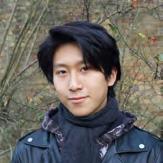
discharge that he was made to put it away begrudgingly. By the end of the hour, only two lines were written.
I would not recommend private tutoring as a way to stay emotionally motivated, though it did help me maintain an adequate level of practice throughout the year. To interrupt the ‘forgetting curve’, one needs a measure of tailored past questions covering a sufficient breadth of topics spaced at regular intervals. As long as exam grades are used to evaluate academic performance, private tutoring provides a sensible alternative source for guidance.
humanities, and the arts. However, mathematics and science were my weak links. I also felt more comfortable asking questions during tutoring, as compared to school. In school, I felt more conscious to ask questions in front of friends and also I felt that some teachers did not respond well to questions that they deemed “stupid questions”. With tutoring, I was paying for their time and to clarify and ask as much as I wanted to.
While I do vouch for tutoring, I must also add that having freelanced in the tutoring industry for four years now, Asian parents tend to go overboard with private tutoring, often overloading the child. This can be counterproductive as the child is given too much to absorb and ends up not absorbing anything at all. tutoring also must be used in moderation for it to be most effective.
Tejas V Hirah has just finished his bachelor’s degree and works as a freelance private tutor. Alexander Tsang, is an undergraduate in his final year of studies.My journey with giving private tutoring began at 17 when I was still a secondary student. At that time, I was asked by my school to tutor some junior students who were lagging in their studies. Initially, I took it up solely to earn some extra pocket money. After all, the hourly tutoring rate was at least twice higher than other part-time jobs. The monetary reward was incredibly attractive to me then.
Being a private tutor on the side is cool and monetarily rewarding, but developing it as a career is something else. Almost everyone I have encountered would display some sort of bewilderment, disbelief, or slight disapproval when I told them I worked as a full-time tutor. Compared with other jobs like lawyers, doctors, or bankers, being a ‘tutor’ is perhaps a not-so-glamourous job, or more brutally speaking, a ‘lowly’ or ‘skill-less’ job. Not many would consider it a proper job unless you are the business owner. It’s not as ‘professional’ as a lawyer, not as ‘wellpaid’ as a banker, and not as ‘stable’ as a school teacher.
Tutoring is like being a sole proprietor running our own business. My earnings are dependent on the number of students I have. I need to build a customer base from scratch to have a good reputation that enables me to get referrals and have more students to teach. If one student drops out, I will bring home less but it inevitably creates a new layer of fear and uncertainty.
Nonetheless, I still choose to be a private tutor as my career, as it gives me the great inner satisfaction I get from teaching students, building relationships with them, and the possibility of influencing lives. Tutoring allows me to get to know a student deeply. I am not just passing knowledge to them, but also knowing each of them individually, including their personalities, background, and family situations. I love empowering them through tutoring, and seeing them enjoy learning and eventually improving their English gives me unspeakable joy. Giving
I believe we should provide students with plenty of compliments and encouragement. This helps to build their confidence and keeps them motivated to continue learning. Positive reinforcement goes a long way in helping
tutoring has become part of my life. When giving lessons, I never feel like I am ‘working.’ It is the feeling of doing something I enjoy naturally and am passionate about.
Throughout the years, I have made some observations from tutoring students. First, many kids these days are ‘warriors’ fighting in the exam battles. In this result-driven and highly competitive society, every score counts. Parents and tutors like myself are working neck to neck every day to help these ‘warriors’ win every battle. Sometimes, it feels like a dilemma, because learning is supposed to be fun, but it’s more realistic to learn to score. Learning becomes an agenda, not something stemming from sheer curiosity to understand more about this world. Students tend to feel tired from the endless school work, thus losing sleep and fun childhood time. Therefore, to empower and equip these ‘warriors’ without terrifying or making them over-stressed, we need the right balance of discipline and love, harshness and encouragement, and pushing and pulling. The education system or learning culture might not be changed overnight, but we can adapt our method and walk with the kids every battle of the way.
Does private tutoring help? It depends on many factors like students’ learning ability, students’ input, tutor’s teaching style, parents’ follow-up, etc. Generally speaking, I’ve noticed over the years that those who received tutoring at an earlier age tend to fare better than children who came for tutoring at a later age. That was because the former can benefit from extended, personalised teaching which addresses students’ weaknesses and individual needs in learning, which can hardly be achieved from regular curriculum education alone.
Sophy Chum has been a private tutor for one year. She is currently still an undergraduate.

 Nicole Tse has been an English tutor at an enrichment centre for 12 years.
Nicole Tse has been an English tutor at an enrichment centre for 12 years.
students to feel good, not only about themselves but also their progress, raising their self-confidence and self-esteem.
One of my students has won a lot of medals in chess but wasn't interested in studies. It's important to recognise that not all students are the same. Good tutors should be willing to teach students of all levels and abilities. We ought to be patient, understanding and adaptable in our teaching approach so that we can cater to the needs of each individual student.
There is no such thing as the “best” tutor, only the most suitable one. If we are willing to put in the effort we can be the most suitable tutor for them. A suitable tutor is crucial in understanding a student’s temperament and providing the best individualised lessons.
Tutors can also benefit from teaching. I can gain valuable experience, and develop my patience and communication skills. I have learnt much, particularly how to relate to students. I also feel a great sense of satisfaction when my students achieve their goals. I can see that all my students have improved themselves, both their self-confidence and their academic results. This feeling of accomplishment is a great source of motivation to continue my teaching!
The basic requirement to attain a good grade is to be hardworking. I personally believe that no matter what you set out to do, hard work is the key to achieving good results and reaching our potential.
Good grades are the result of a combination of factors, including hard work, intelligence, and a good teacher.
A good tutor can inspire and motivate students, provide effective instruction and feedback, and offer guidance and support when needed. Unlike school teachers who often teach in a ratio of about 1 to 30, many private tutors can provide 1 to 1 tutorial services which focus more on the student’s needs.

I am currently a first-year student at HKU and have a lot of academic obligations and responsibilities. I don’t have much leisure time for myself, I need to be very organised, have better time management and manage to find a balance between my own studies and helping others.
Some of my family members, particularly my grandparents, worry that I am too tired and busy. They have asked me to cancel some tutorials if I get too pressured. I am extremely grateful for their love and care, but thankfully, I can deal with all my stuff and achieve a satisfactory work-life balance.
I am normally a cheerful, kind and caring person, but sometimes, I do lose my temper. Then, I remind myself that what I am doing is not for myself and that I am trying to help someone else.
I’m very sure that although I may not be the best tutor, I’ll always try my best so that my students can achieve their life goals.
My philosophy towards learning and education is that encouragement is better than criticism, no matter whether we are in school or university. Only with a positive mindset can we make education less stressful.
Christine has a boy aged 14 and a girl aged 16
Ithink that after-school tutoring is essential if you want your child to get ahead. This has nothing to do with the quality of education that the school or teachers provide; it has more to do with exam preparation and ensuring that there are no gaps in their understanding of the coursework. I want my children to go to the best universities and succeed in life. That only comes with hard work and sacrifice. Better that they learn it at this age.
Ting Ting has two boys aged 16 and 18
Neither of my sons is very academic, they would much rather play video games or make online content and videos. I am fully aware – because of the number of times their teachers have told me – that neither of them pay attention in class. I know that they have talents, but these are not really academically related. Unfortunately, our entire system of education at the school level is based on examination results and book learning, so if I want my sons to have any kind of future, they must be able to pass their DSE exams.
James has two boys aged 11 and 15
I went to a vocational institute and not a university. I would like my sons to have better opportunities than me. If that means that if they need to go for extra tutorial classes, then that is what they will do. I will do anything for them to get ahead.
Janel has two boys, aged 13 and 14, and a girl, 17
We are not Chinese, but we wanted our children to study Mandarin in school. There is no way that we can offer them support at home, so all three attend after-school language tutoring three times a week. This extra help is what they need to not only manage their homework but also to ensure that they can keep up in class and not fall behind.
Ar Hoi has a daughter aged 9
I remember I had to go for extra classes, and now I send my daughter. I think it is a normal part of the education system.
Ithink that after-school tutoring is just another big business. I have read much about so-called ‘celebrity’ tutors and various tutorial schools with exorbitant rates. They all claim to teach good study habits, help develop confidence and boost self-esteem, as they “guarantee” admission into some Ivy League University or Oxbridge. I don’t believe it! The only reason I could see sending either of my children to a tutor is it they were just not able to understand what was being taught and the school was not offering any support.
I have to be honest; I used to send my son to a famous math and language tutoring school when he was younger. They taught him specific techniques and claimed to ‘develop his potential’ by making him solve worksheet after worksheet. I found that while his rote learning skills improved, nothing else did. By the time he was mid-way through Primary School, I stopped this. Now, he receives no afterschool tutoring because I have taught him that if he can’t figure something out, he needs first to ask his teacher and even check with his classmates. Both my husband and I are also here to help him with his work. This system works for him, but I can see how it might not for others.
Iam rather ambivalent about after-school tutoring. It seems a waste of time if the children are paying attention in class and their test and exam results indicate they are passing. The money can be better spent on joining an extracurricular activity like art or sports, or music. There is no need to repeat a school day. It is much better to learn something new.
Iam a single mother and have to count the costs. I know a lot of my children’s friends go for after-school tutoring and that they would like to, but I just cannot afford it. I have also noticed how those with tuition are exhausted, and some lack basic social skills. Maybe these are my justifications, but as neither of my girls is really failing, I think they can get through school on their own steam. My younger daughter benefits from having an older sister who can help her.
Isee tutoring as necessary support for a weak student in the subjects he or she finds difficult. But the reality in Hong Kong (and I know this is true in many other Asian countries) is that parents are sending their children for tutoring to supplement or enhance their book learning in the hopes that they will do better in exams. That, to me is just silly. I see it as just adding pressure on the child and not allowing them to develop interests independently, just focusing on results.
Fanny has twin boys of 12 Eric has two girls of 11 and 14 Ho Yan has a boy aged 13 Crystal has two girls aged 13 and 16 Oriana Hon
Oriana Hon
Prodigious growth for private supplementary tutoring has become a widespread phenomenon worldwide in recent years. While its focus suggests shadowing the institutional logic of formal education, recent developments, and changes also focus greatly on personalised learning and achievement.

In earlier decades, shadow education was primarily associated with parts of East Asia1, South Asia2, and then worldwide as a global phenomenon3 since 2010. According to a UNESCO report, four “pillars” for education were outlined in this table on the right. They have proven to be relevant for sectors in data warehousing, data interchange and interoperability, emergency response systems, laboratory and diagnostics information systems, pharmacy information systems, public health, and disease surveillance systems, and tele-medicine.
• Learning to know
• Learning to do
• Learning to live together
• Learning to be
Within Asia and the Pacific, four main sub-regional groups may be identified:
• East Asian countries that include Japan, Hong Kong, South Korea, and Taiwan, which have long traditions of shadow education and are the most visible globally.
• Patterns can be linked to deep Confucian traditions that value educational achievement, but as in other parts of the world, they also reflect social competition.
• Mainland China started later than other parts of the region because until the 1980s, its government strictly prohibited private enterprise, Shadow education expanded rapidly from the 1990s until a 2021 government crackdown.
• South Asian countries such as Bangladesh, India, Pakistan and Sri Lanka, also have long traditions of private tutoring.
• Tutoring is driven by social competition and teachers desiring to increase their incomes.
• Similar patterns are evident in Southeast Asia, including Cambodia, Myanmar, and Vietnam.
• Northern, Central and Western Asia, including Mongolia, shadow education has similarly expanded to become a major activity.
• The Pacific such as Australia is culturally very different but has also seen the emergence of the phenomenon. Trends have to some extent, been led by Asian immigrants who have then increased the competitive pressures on others.
• Southern Europe also known as Mediterranean Europe, comprises fifteen countries, and has a total population of more than 150 million people. Some of the major countries in the region include Spain, Italy, and Greece. It has particularly high rates of tutoring, led by Greece and including Cyprus. Tutoring is also strongly evident in Malta, though it has not reached the scale of Greece and Cyprus.
• Eastern Europe as defined by the United Nations Statistics Division (UNSD), includes the countries of Bulgaria, Czech Republic, Hungary, Poland, Romania,
Russian Federation, and Slovakia, as well as the republics of Belarus, Moldova, and Ukraine. It has traditions of tutoring that predate the political transitions of the late 1980s and early 1990s, but since those transitions, the scale of tutoring greatly increased. One major force was the collapse in purchasing power of teachers’ salaries after the demise of the Soviet Union. Teachers remaining in the teaching profession had to find supplementary earnings to support their families, and tutoring was an obvious route.
• Western Europe is made up of nine sovereign nations. These nine countries are Austria, Belgium, France, Germany, Liechtenstein, Luxembourg, Monaco, Netherlands, and Switzerland. It also has long traditions of private tutoring on a small scale. However, during the last decade, the volume of tutoring has greatly increased. It reflects the increasing competitiveness of societies in the context of greater mobility of labour and skills. It is part of the marketisation of education, which has become more socially acceptable in these countries.
• Much tutoring is provided on a one-to-one basis, in pairs, or in very small groups; but other forms of tutoring are classroom-based.
• European countries have few “star tutors” of the sort found in Hong Kong Special Administrative Region (HKSAR) in which teenagers are encouraged to view their tutors like film stars or popular musicians and in which pupils pack large lecture theatres with overflow rooms to which lessons are transmitted by video (Eng, 2019; Yung & Bray, 2017).
• In general, the costs for the students are much lower in the large classes than in the small ones.
• Most obvious among new modes of tutoring with new technologies is online tutoring, which can be achieved face-to-face in real-time using web cameras. This mode crosses spatial boundaries.

• The Internet can also identify tutors who will make home visits in person. Every major European city seems now to have one or more websites that provide matching services through which households can identify tutors in their neighbourhoods. These tutors are commonly self-employed, and the managers of the websites cover their administrative costs through commissions from the tutors and/or the clients.
Conclusion:
Families in higher socio-economic groups have more opportunities to invest in tutoring and commonly use this opportunity.
• Northern Europe can be divided into three parts: Scandinavia, the British Isles, and the Baltics, comprising of 10 sovereign nations. It seems to date least affected by the rise of private tutoring. Scandinavian countries seem to maintain stronger traditions of schools adequately meeting their students’ needs. Within Scandinavia, shadow education is becoming evident in Sweden and with patterns in Denmark and Finland not far behind. Note:
The global tendency to measure the quality of education through examination scores, PISA rankings, and other assessment tools has implications for conceptions of learning and the roles of the tutoring industry. Much of the international literature on education and development stresses academic achievement. The first pillar of education from the UNESCO report, as cited earlier – learning to know – maintains its central helm in mainstream education, since knowledge is easier to measure than the other three pillars: learning to do, living together, and learning to be. Shadow education follows the same path and reinforces the tendency.
Increasingly, a third function is emerging in which private tutoring becomes a substitute for regular schooling rather than a shadow. This is evident In Azerbaijan, Turkey, Thailand, and South Korea. Entrepreneurs in the tutoring industry wish to provide an officially recognised alternative track. If this is permitted, the industry will move further out of the shadows into a new type of relationship not only with the regular school system and the wider society.
References:
1. https://www.researchgate.net/publication/308895794_Bray_KobakhidzeQualities_of_Ed
2. https://www.adb.org/sites/default/files/publication/29777/shadow-education.pdf
3. https://www.researchgate.net/publication/225657209_The_origin_of_universal_shadow_education_What_the_ supplemental_education_phenomenon_tells_us_about_the_postmodern_institution_of_education
4. https://tcf.org/content/commentary/global-view-pandemics-effect-higher-education/
5. https://www.researchgate.net/publication/313678401_Shadow_education_Features_expansion_and_implications
6. https://pubdocs.worldbank.org/en/418511491235420712/Education-Strategy-4-12-2011.pdf
two parents/guardians had different levels of education, the higher of the two was used for the purposes of this table.
Elementary and high school students in Hong Kong may now access the “Easy Volunteer • Easy Tutoring” platform to receive prompt and effective online academic support in real-time.
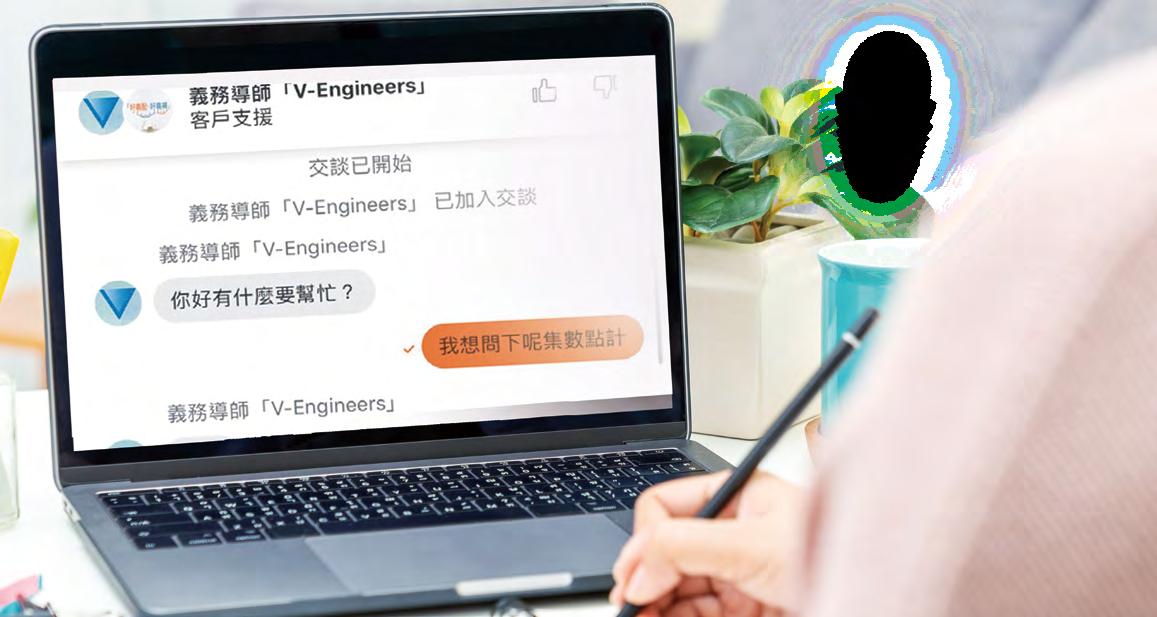
The COVID-19 outbreak had a serious impact on remote education and service-learning implementation globally. To alleviate these impacts, the “Easy Volunteer • Easy Tutoring” platform was launched by the Federation’s Youth Volunteer Network in February 2020, to provide free effective and real-time online academic support to elementary and high school students. Over 10,000 academic inquiries have been answered with the support of volunteer tutors from high schools and universities so far.

Operating days – Monday to Saturday
Operating hours –
Monday to Friday 16:00 to 22:00
Saturday 12:00 to 22:00
To access for more information, please scan there QR codes: Scan these QR codes – LINE Messenger
Website – https://yvn.hkfyg.org.hk/study-en/

“I have been volunteering for two years, mainly coaching on Maths for three hours per week. At times, I get students asking questions related to other subjects. When I started volunteering, it was mainly to help students who needed more learning resources and materials by answering their queries. Sometimes, the number of students that appear online could be from zero to more than 10 concurrently!
Helping them to understand the steps to solve each question, instead of telling them the answers, has been very fulfilling so far. I would like to keep them develop long-term, with logical and critical thinking skills.
Aside from that, I truly love my students! When I see familiar names coming online to ask questions about their schoolwork, it is a gratifying moment that I am doing something right and meaningful. They are amazing learners that bring a true worldly variety of experiences, cultures, and thoughts. I learn from them, and they learn from me. They are creative, intelligent, and intuitive.”

“Having the opportunity to volunteer with the Federation has been a wonderful experience so far. I started volunteering in 2022 in my areas of expertise, Chinese, English and Maths.

Online lessons received during the COVID-19 outbreak made it more challenging for students in Hong Kong to be guided properly or evaluated. Through my efforts, I hope I made up for the shortcomings and helped the students catch up in their learning progress.
The experience has been nothing short of a blessing. I learnt how to take more time and patience to break down the steps involved or provide examples to help the students grasp the academic concepts better. Other than academic excellence, I also try to help the students develop confidence and a love of learning, by encouraging them to ask questions, explore new ideas and approaches, and develop critical thinking skills that will serve them well in all areas of their lives.”


• Tutors being deemed as ‘celebrities’ in Hong Kong is interesting observation to note, as the definitions of becoming a celebrity are very vague.
• Celebrity tutor Spencer Lam shares his personal successes of helping students improve grades, as well as his unique teaching methods that caught up with the media exposure he receives subsequently.
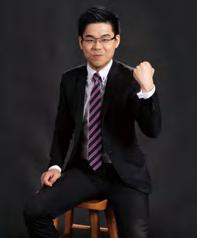
• Private tutoring should continue to be viewed as supplementary and not be taken as the main priority in academic excellence.
Previous studies on celebrity culture and celebrity endorsement focus on various individuals — such as the British Royal Family — up to ordinary people who earn their celebrity status via social media. Becoming a celebrity is easier nowadays, and include micro-celebrities whose fame rises through the Internet and social media.1
Academic journals defining what constitutes a celebrity are wider or sometimes vague, because any individual who is famous or well-known can be perceived as a celebrity nowadays.2 Other studies3 argue that public recognition and regular media exposure are keys to being considered a celebrity.
• 香港補習界近年有個有趣的趨勢——導師經常會 被視為「名人」這亦讓名人的定義變得模糊。
Gwen Sin• 名人導師林栢勤分享他協助學生提升成績的成功經 驗,以及他獨特的教學方法後,引來媒體爭相報道。
• 長遠而言,私人補習應擔當輔助學生的角色, 而不應被視作追求優異成績的主要優先方法。
Local private tutor, Spencer Lam who runs his own tutoring practice with a team of more than 10 tutors specialising in gearing local students from the Hong Kong Diploma of Secondary Education Examination (HKDSE) to the International English Language Testing System (IELTS).
“I have been providing private part-time tutoring in English for the past 10 years in Hong Kong. Previously, I
Thegrowing popularity of ‘‘celebrification’’ and how celebrities play such an important role even in the context of shadow education is an interesting topic for exploration. Youth Hong Kong speaks to one such ‘‘celebrity’’ tutor, Spencer Lam to gain better insight.
worked as a Management Trainee at an international bank. The satisfaction of helping my students excel helped me decide to take the pay cut and make the switch to fulltime tutoring in 2019. From tutoring, I meet students across various age groups and academic levels. My experience as an English tutor has also given me a thorough understanding of the education system in Hong Kong and the challenges that students face in their academic pursuits.”
“Having taught more than 5,000 students in the past 10 years, and having taught most of them individually, I tailor my teaching approach to suit each student’s learning style and pace. Of course, I also conduct small group classes for some subjects, such as English writing. Small group classes allow students to learn from their peers and engage in group discussions.”
“As a private tutor, my personal goals are to help my students achieve their academic goals, improve their confidence and self-esteem, and develop a love for learning. While I wouldn't consider myself a “celebrity” tutor, I have had several success stories. For example, I have had students who have improved from a C to an A grade within a few months of tuition, and others who have gone on to study at top universities in Hong Kong and overseas. These successes created a lot of hype and buzz about my unique teaching methods, and more than 11 media agencies have interviewed me to date.”
The commodification of education has unfortunately led schools and universities to treat education as a commodity in recent years, where tuition centres are run more for economic returns.4
Spencer argued further that it is not the marketisation of his tutoring skills that led his services to be highly sought after. “My tutoring methods are unique — I focus on developing a strong rapport with my students, understanding their needs and learning styles, and creating personalised learning plans with them. Various teaching techniques, such as visual aids, interactive activities, and real-life examples, are also adopted to make the learning process engaging and enjoyable for my students. As part of the active learning process, I encourage my students to ask questions, think critically, and develop their problem-solving skills. These techniques have proven effective in improving my students’ academic performance and fostering a love for learning.”
“As a private tutor, I can provide personalised attention and guidance to help students overcome difficulties and improve their understanding of the subject matter. Private tutoring also helps students to achieve the goal of scoring higher grades in their exams with targeted support and coaching to improve their performance. Students with specific learning needs or challenges, such as ADHD or dyslexia, can also benefit from private tuition as it can be tailored to their requirements and provide a more conducive learning environment,” Spencer elaborated.
The rise of tutoring centres engaging more aggressively in marketing activities, such as highly visible advertising placements on public transport and central districts in Hong Kong other than social media, nonetheless represent a novelty and is mostly still uncommon in other countries.
“It is noteworthy that private tutoring should not replace the efforts of the students and parents in studying and preparing for exams. Private tutoring should be viewed as a supplement to the efforts of the students and parents in achieving academic success,” concludes Spencer.
References:
1. Khamis, S., Ang, L. and Welling, R., 2016. Self-branding, ‘micro-celebrity’ and the rise of social media influencers. Celebrity studies [online], 8(2), 191-208.
2. Banister, E. N. and Cocker, H. L., 2014. A cultural exploration of consumers’ interactions and relationships with celebrities. Journal of Marketing Management [online]. 30(1-2), 1-29.
3. Leslie, L. Z., 2011. Celebrity in the 21st century. Santa Barbara: ABC-CLIO
4. Ricci, F. A., 2018. Marketisation of higher education: ethical and societal dilemmas In: Poff, C. and Michalos, A. C., eds. Encyclopaedia of Business and Professional Ethics [online], Springer International Publishing, 1-6.
The feedback I have received from both students and parents has been overwhelmingly positive, which reaffirms my belief that private tuition can make a significant difference in a student's academic journey.Private Supplementary Tutoring Remains Supplementary
• Maria So made a career switch from finance to law in 2007.
• Her decision to return to Hong Kong to practise law is partly due to better career prospects, and to be where her family is.
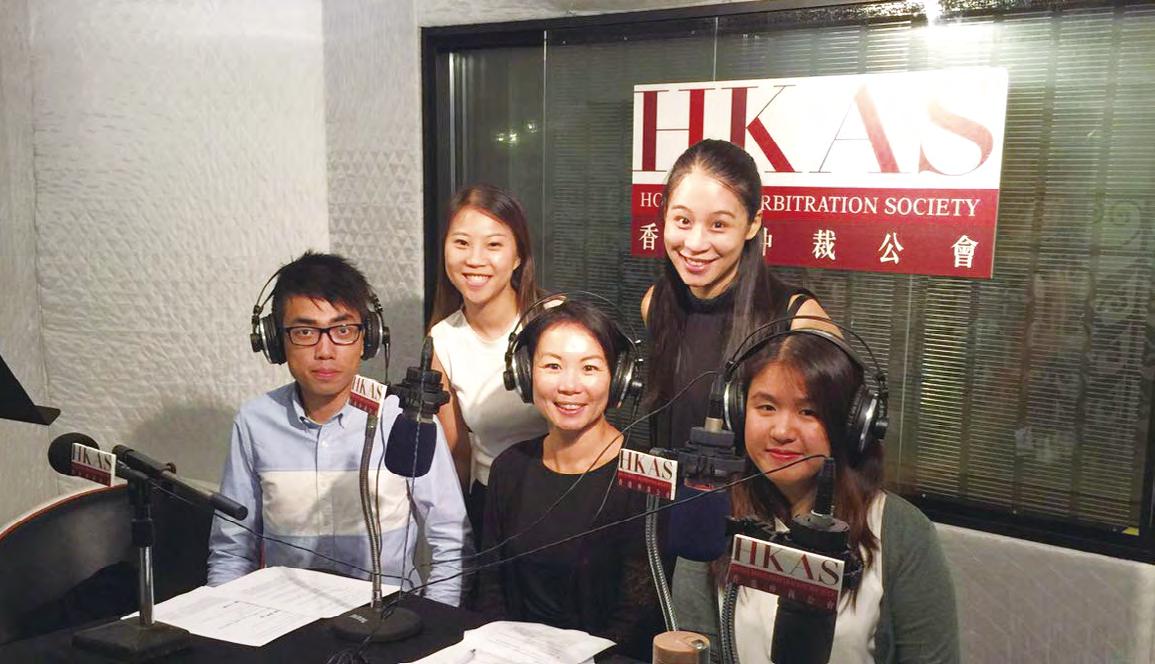
• The accessibility and ease of connectivity and infrastructure within Hong Kong were added plus points for Maria’s constant quest to keep learning and upgrading herself.
From finance to law, this is the major career switch that current-day barrister Maria So undertook in 2007. Maria was exposed to different countries and cultures at a young age. At fourteen, she left Hong Kong for Grade 9 boarding school in Connecticut, United States, and majored in accounting and finance at New York University. Upon graduation, she landed an auditor's job in New York and worked there for a few years, where she went on to get accredited as a Certified Public Accountant (CPA). In a blink of an eye, Maria didn’t realise she had resided in the United States of America for 12 years.
• 蘇佩敏於 2007 年從金融業轉行到法律界,自此就 沒有回頭路了。
• 她決定回流香港從事法律工作,部分原因是為 了更好的事業前景,以及與她的家人一起。
• 香港交通便利,四通八達,加上擁有完善的公共設 施,成為蘇佩敏不斷增值進修自己的有利條件。
At 25 years old, Maria thought she was still young then, and did some serious thinking about what else she could do as a further exploration of the world and also if being an auditor was really what she wished to do for a lifetime. That’s when she embarked on a Graduate Diploma in Law (GDL) when in London. She went on to read law at a postgraduate level and took up the Postgraduate Certificate in Laws (PCLL) in Hong Kong. With this intensive oneyear legal training full-time, she was then qualified to practice as a barrister in Hong Kong. One thing led to another and working as a barrister is Maria’s true calling, and as the saying goes, there is no turning back since then.
Gwen SinReturning to Hong Kong proved to be a turning point for Maria So’s career, where she found her true calling working as a barrister.
“The return to Hong Kong was actually good timing for me in 2006. It was a good opportunity to see if eking out as a legal professional was truly a new career path for me. My thought then was if I couldn't get used to the working style in Hong Kong, I could always move somewhere to work or return to being an accountant.”
“The other reason was also because all my family members are based here in Hong Kong. I was away from my parents especially for a good 12 years. Returning to Hong Kong is just like returning to base camp, where home truly is.”
Returning to Hong Kong is just like returning to base camp, where home truly belongs.
Fortunately for Maria, her practice as a barrister in Hong Kong worked out well. She found it most comfortable being in this vibrant city, having travelled extensively and also having experienced living overseas in different countries previously. Hong Kong is a melting pot of different nationalities and cultures. Maria enjoyed making and meeting friends from these diverse backgrounds.
Likewise, the accessibility and ease of connectivity and infrastructure within Hong Kong give Maria high optimism and the drive to never stop learning. “I have been constantly challenged in a good way to think critically a few steps ahead, and it makes me progressive in my practice over the years.”
On top of her full-time work as a barrister, Maria participates in answering papers on different issues released by the Hong Kong Special Administrative Region (HKSAR) Government from time to time. What Maria enjoys tremendously is being a mentor to different groups of youth. She allows interns to shadow her at work and shares her experiences as a female barrister in Hong Kong. “I hope to instill confidence and openness, and even the art of speaking up while practising as a female criminal barrister in Hong Kong so that typical stereotypes are less of an issue. Allowing them to understudy me even for a few days gives them a better idea of what it is like, unlike what is seen in television drama series or mugging from textbooks. Hopefully, it also inspires them to stay on in the profession, while at the same time advocating to be law-abiding citizens.”
Besides a busy work schedule as a barrister, Maria is also an active volunteer at different Non-Governmental Organisations (NGOs) such as the Zonta Club of Hong Kong II; the Hong Kong Women Professionals and Entrepreneurs’ Association; the Hong Kong Federation of Women, the Hong Kong Women Lawyers, amid government-appointed sub-committees most recently. In her free time, Maria still takes on travelling as her quest to explore new cultures and new experiences. She also skis and scuba dives avidly, and hikes extensively, all of which these activities could be greatly enjoyed in Hong Kong as well!

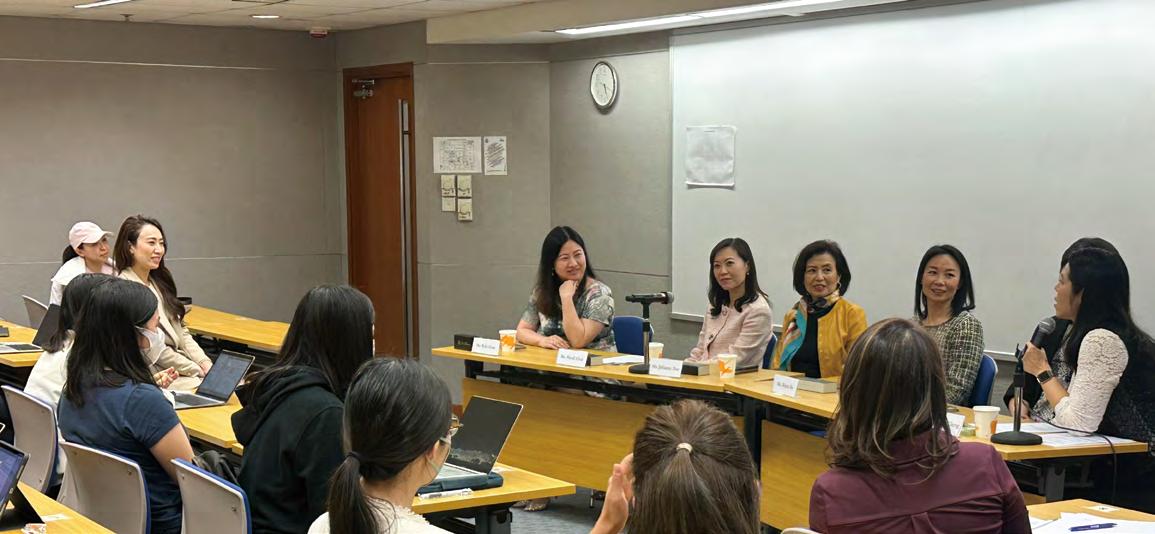
Asa diverse city, Hong Kong should take advantage of this uniqueness and promote different cultures and traditions by facilitating exchanges, and also organising regular traditional festivals that are celebrated in these communities.
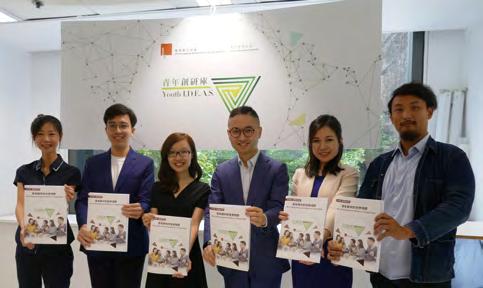
The Youth I.D.E.A.S., as established by the Federation’s Youth Research Centre (YRC) recently released a report on the study themed “Why a Global Perspective Matters to Young People.” In conducting this study, data were collected between February and April 2023 through an on-site survey of 522 young people (aged 15 to 34), parallel-case interviews with 18 similar individuals, and researchexclusive interviews with six academics and experts.
522 young people (aged 15 to 34)
How important do you think it is to have a global perspective?
18 individuals with exposure within and outside Hong Kong (aged 15 to 30)
6 Academics and Experts
A significant percentage of young people surveyed viewed themselves as global citizens (87.7%) and considered having a global perspective as important (86.0%).
Important (Very Important/Somewhat Important)
Not Important (Not Important/ Unimportant At All)
The top three global issues that concern young people most are the global economy (37.4%), environmental pollution (29.1%), and war/conflict (23.2%).
Other findings:
• The most important value of having a global perspective is to appreciate/respect different cultures (34.1%). The most important ability is to comprehend the current state of the world (31.4%).
• Young people rated an average of 5.46 points when asked to evaluate the adequacy of having a global perspective of their own, which is slightly above the general level of 5 points.
• Lack of resources to experience life outside of Hong Kong is the biggest obstacle that respondents face and which prevents them from exploring global connections (43.1%). The second most common obstacle is the lack of opportunities to have contact with different cultures (31.2%).
Key points from individual youth and academics/ experts interviews
Based on the experiences of individual youth cases, having a global perspective was meaningful to them, such as bringing with more possibilities of enhancing their sense of identity as they become more confident in the merits of local society.
Common factors nurturing of global perspective development include having curiosity, having peers as companions for mutual encouragement, and enjoying in-depth experiential learning.
One expert added that the key to a meaningful exchange programme is to reflect on his/her experiences of the world, which can lead to a deeper understanding of themselves.
Other remarks made by Youth I.D.E.A.S. Think Tank members who also participated in this study include:
Kelly Cheng, Deputy Convenor: “Hong Kong has earned a reputation as an international city. While it is on the way to further integrating with the country and growing into a centre of development in several key areas, there is an increasing demand in the city for talents with cross-cultural competence, enthusiasm to serve the country and society, and the ability to be engaged globally. A global perspective
is crucial for the future development of young people in Hong Kong.”
William Du, Group Member: “Hong Kong is a multicultural and diverse city. The HKSAR Government and society should take full advantage of this diversity and promote different cultures and traditions of the various nationalities and ethnic groups by facilitating exchanges, as well as regularly organising famous festivals of different places around the world at the community and district level to open up opportunities for young people to experience different cultures locally.”
Anita Lee, Group Member: “This research shows that young people are concerned about global issues and value interaction between individuals and the world. The Government should establish a proposal platform, enabling young people to propose innovative and feasible improvement plans on global issues and have the opportunity to be funded for visiting the relevant international organisations outside of Hong Kong for exchanges. This will broaden the young people’s horizons.”
Alfred Lam, Group Member: “In recent years, many emerging economies have established closer economic and trade ties with the Mainland. The Government should consider offering scholarships to young people in Hong Kong who are interested and whose academic performance meet the requirements to study in emerging economies, including countries/regions along the Belt and Road Initiative, to enrich their overseas experiences.”
Anson Ho, Group Member: “The Government and society as a whole should promote youth-oriented exchange programmes in which young people have more space for leadership and involvement in different stages of the programmes, including itinerary design, activity arrangement, and experience reflection. This could improve the quality and global perspective among young people.”
Report No.71 HKFYG Youth I.D.E.A.S. Youth Development and Engagement Group
Published title Why a Global Perspective Matters to Young People
Respondents Onsite survey period with 522 young people aged 15 – 34 from 29 March to 2 April 2023. Parallel individual case interview period with 18 youth aged 15 – 30 from 15 February to 30 March 2023. Interview period with 6 scholars and experts from 6 March to 6 April 2023.
More details in Chinese https://yrc.hkfvg.org.hk/2023/05/28/yi071/
Enquiries Sharon Cheung 3755 7039
WithMichelle Yeoh winning the Oscars this year, what would it mean for Asian films, and dreamers next?
On 13th March, Michelle Yeoh, a Chinese Malaysian who starred in Everything Everywhere All at Once, took home the Oscar statuette for Best Actress in a Leading Role at the 95th Academy Awards, becoming the first Asian to attain the award. Given that Yeoh has broken the racial glass ceiling that has long existed, some see the news as an important milestone toward the global appreciation of ethnic diversity in movies.

“For all the little boys and girls who look like me, watching tonight, this is the beacon of hope and possibilities!”, Yeoh stated upon receiving her prize.
As a youngster who grew up in a city named “Eastern Hollywood”, Chinese movies were a crucial part of my childhood. When the weekend came, I would find as many excuses as I could to stay at home – just to sit in front of the television and wait for movies so that I could bury myself in two hours of joy and laughter. Meeting friends from other countries, I am often asked, “Have you met Jackie Chan?”, or “Do you know any movie stars?”. Pop movie culture is such as easy topic to link me with other teens no matter wherever I go.
Living in Hong Kong, I have always been proud to be part of this success and am glad to see the significant impact Chinese movies have had on Asia. For instance, names like Andy Lau, Chow Yun Fat, Anita Mui, and Stephen Chow hold a special place in the hearts of thousands. In addition, recently in Korea and Taiwan, commemorative events have been held to memorialise Leslie Cheung, an illustrious Hong Kong actor. Despite the fact that it has been 20 years since his passing, many still recall his days of former glory, which highlights how prominent and far-reaching Chinese movies have been throughout the years.
However, while we, as part of the Eastern culture, recognise the success of our film industry, I couldn’t help but wonder, does the Western world realise how good our films are?
According to the IMDb dataset, in the 20th century, only Chinese movies have won the Palme d’Or, the highest prize at the Cannes Film Festival, and none has won the Academy Award for the Best Picture.
However, with globalisation and more cultural exchanges between countries, Chinese and other Asian films, are starting to be known to a broader range of international audiences. For instance, Chinese movies such as Crouching Tiger, Hidden Dragon (2000), In the Mood for Love (2000), and Internal Affairs (2002), were widely popular. Additionally, as streaming media grows in popularity, it is now easier to now watch movies from different regions, thus building up Asian films’ reputation globally.
While more pictures are known across nations, their excellence is also acknowledged. In 2002, Spirited Away, a Japanese animated film, won the Golden Bear at the Berlin International Film Festival; In 2007, Lust, Caution, a film produced in mainland China, Hong Kong, Taiwan and the US, won the Golden Lion Award at the Venice Film; in 2020, Parasite, a South Korean dark comedy, became the first Asian film to sweep the board in the Golden Globe Award, Palme d’Or and the Academy Awards.
The rising status of Asian films in the global community signifies how the world now accepts and appreciates diversity on film.

As Yeoh said in her speech, “The Academy [is] acknowledging, embracing diversity and true representation. We need this because there are so many who have felt unseen, unheard… We deserve to be heard, we deserve to be seen, we deserve to have the equal opportunity.”
This historical moment, other than being a glad tiding to the Asian community, is also an encouragement to everyone who wishes to pursue their dreams, that their potential should never be limited based on their race, colour, or nationality. In her 40-year journey, despite all the hurdles and difficulties, Yeoh demonstrates that obstacles can be overcome, with passion and persistence.
In Yeoh’s acceptance speech, she also emphasised her gratitude towards Hong Kong, where she was given opportunities to be known and recognised. While her gratitude certainly makes us proud, the mention also reminds us how Hong Hong has been a place for people to materialise their dreams, or as we often say the “Dream Factory”.
For me, writing has been my passion since I was a child, yet after being in high school, the heavy academic workload and the extracurricular activities have drastically reduced my time to sit down; clear my mind, and enjoy the thrill that words have long given me. Nonetheless, after hearing Yeoh’s speech, I have become more aware of the fact that you are the one who manages your time and opportunities, not the other way around. I realise no more excuses can stop me from chasing my dream, especially when I am fortunate enough to be born in Hong Kong, a place that provides me with valuable resources. With that in mind, I have started to squeeze in at least a couple of hours every week to write. Even though I can expect difficulty in keeping this habit, I can tell myself years later – I will have no regrets about following my dream.
As an Asian actress who debuted in Hong Kong, Yeoh demonstrates how we, as Hong Kongers, have the potential to thrive globally with our effort. While the globe develops to truly put all externalities aside, we can anticipate the shattering of the language and cultural barriers, and the emergence of more insightful Hong Kong, Chinese, or Asian works on the international stage – or maybe my works too.
Ivan Ng is a high school student who loves reading and writing. He is passionate about history, world affairs, and express his views and visions through words, with his works often appearing in school magazines. He also enjoys public speaking, always being selected as the best debater and winning seven individual championships at the Hong Kong Schools Speech Festival in 2022.
Gender inequality in the workplace is a prevalent issue that not only limits the potential of individuals, but also hinders society’s ability to flourish. Gender equality is crucial for building a brighter future for everyone, especially for young women, and is not merely an issue of fairness and justice. Gender equality is ‘the state where access to rights or opportunities is unaffected by gender’1. However, not many countries in the world can actually claim to be gender equal. I will be considering how gender disparities affect young people like me, and what can be done to stop this.

In the world we live in now, there is no doubt that certain careers are traditionally ‘male-dominated’, particularly STEM careers such as engineering or computer science. So, it is unsurprising that when considering these careers, I feel a sense of doubt or worry. For years I have wanted to pursue a career in engineering: I have always been fascinated by physics and maths and enjoyed the intersections of these subjects. However, in this industry, women only comprise a small percentage of the workforce. Some of the main issues young girls are bombarded with every day include implicit biases and sexism, stereotypes,
and a lack of role models. Despite this, I am still keen on a male-dominated career. Firstly, if someone has a genuine interest in a certain field, they should be driven by their desire to make a difference and not be discouraged by gender disparities. I also feel that change can largely be created amongst the youth and upcoming generations. Due to an increasingly open-minded and adaptable youth population, which is growing up in a time where gender roles are changing rapidly, expectations and willingness to promote gender equality are high. Young people are the future leaders of the world, and we possess the power to break traditional stereotypes, where women should be discouraged from working in STEM, and can create a more equitable workforce generally in the future. I also believe that contributing to diversity in the workplace can benefit us in many aspects, for example, by offering different perspectives to fields, promoting innovation, and creating a more inclusive workplace culture. I want to be able to make a difference in the world by helping to create a more equitable and inclusive workplace culture that encourages more women, especially young girls, to take up careers despite the stereotypes against them.
Alana de BlankThe writer opines that young people like her are equipped with the right empowerment to break traditional stereotypes to create a more equitable workforce and as future leaders of the world.
Looking around me at school, I have noticed first-hand the lack of girls taking up STEM subjects, and they have often told me they feel uncomfortable or afraid to attend STEM societies after school. Whilst this is what I have observed in the UK, the situation isn’t much different here in Hong Kong, where only 53.6% of the female population is part of the workforce generally2. This share is significantly lower than those in neighbouring countries such as Singapore and so, change is needed locally.
I also would like to touch on the topic of gender fluidity. The concept of gender fluidity is that gender is not set and that people can express themselves outside of conventional gender norms. When selecting a career, gender fluidity can have a big impact on how people view and approach their career goals. Particularly genderfluid people could be drawn to occupations that go against conventional gender roles and expectations. In STEM disciplines, which have historically been seen as being dominated by men, this is especially important.
To overcome gender inequality in the workplace and provide opportunities for women to flourish, society needs to do more. Without doing so, girls will grow thinking they are less than they are and will lack the confidence and skills needed to pursue what they want. Lack of change in maledominated industries will lead to limited career opportunities,

hostile work environments, and imposter syndrome: the feeling that one is not competent or qualified to complete a role or task. By increasing awareness of gender equality and creating discussions about this in all aspects of our life, we can reduce the stigma surrounding this topic and raise a generation where girls have equal opportunities to their counterparts, allowing society to flourish as it should. I hope that one day gender will no longer be a barrier to pursuing a career in a particular field and I strive to become a rolemodel to young girls who, too, are interested in STEM.
References:
1. Martinez, H. (2022). What Is Gender Equality? Definition, Examples | United Way NCA. [online] United Way NCA. Available at: https://unitedwaynca.org/blog/what-is-gender-equality/.

2. Lam, D. (2022). Gender Equality in Hong Kong: Interview With TWFHK CEO - The HK HUB. [online] thehkhub.com. Available at: https://thehkhub.com/what-gender-inequality-looks-like-in-hong-kongsworkforce/#:~:text=Surprisingly%2C%20for%20a%20global%20city%2C%20Hong%20Kong%20is [Accessed 16 Apr. 2023].
Alana de Blank was studying at an international school in Hong Kong before continuing with her lower sixth education in the UK currently. Her fondest memories of Hong Kong would be time well-spent at the beach or the park with her family and dog, as well as enjoying the delicious food in Hong Kong. She enjoys sports, specifically netball and athletics, and reading.
The Hong Kong Special Administrative Region (HKSAR) Government recently announced that a new issue of consumption vouchers for eligible registered persons would be disbursed in July, which widens the public’s access to electronic payments (e-payments). Hong Kong was the first city in the world to start the use of electronic payments. But in recent years, the development of e-payments or e-wallets have been overshadowed by mainland China and neighbouring countries. If Hong Kong can seize this opportunity to revitalise the development of electronic payments ( also known as “e-payments”) and collaborate with other cities in the Greater Bay Area (GBA) in financial innovation, it will help strengthen Hong Kong's position as an international financial hub and bring more opportunities to young people.
Since the outbreak of COVID-19, the Government has distributed several rounds of consumer vouchers to boost the economy, changing people's spending patterns and generating more electronic transactions. According to the Government’s statistics, the number of major stored value payment platforms has increased to 6.6 million consumer accounts and around 130,000 merchant users since the launch of the voucher scheme. For the first time on record in 2019, the use of e-payments by consumers in Hong Kong surpassed that of cash.
E-payments, to put it simply, is the replacement of a paper-based payment process with an alternative electronic way for retail transactions. In Hong Kong, e-wallet payment services can also be divided into two categories: stored value and non-stored value. Hong Kong is a pioneer in e-payments with a history of using the Octopus Card, a reusable contactless stored value smart card for online and offline transactions since 1997.
As technology advances and countries worldwide accelerate digitisation in the financial and banking sectors, e-payments are at the heart of the transformation of the financial services industry, thanks to their ability to improve the economy's efficiency, operational cost savings, and drive industrial transformation and innovation.
During The HKFYG M21’s programme “ With All Our Might ,” several young professionals pointed out that digitisation has become inseparable from our lives and the global economy, and that Hong Kong must step up its game to keep up with the trend. One of the barriers to the promotion of e-payment is the lack of widespread support from small merchants due to multiple levels of service provider fees and the inflexibility of cash flow because of the long time taken for payment to arrive.
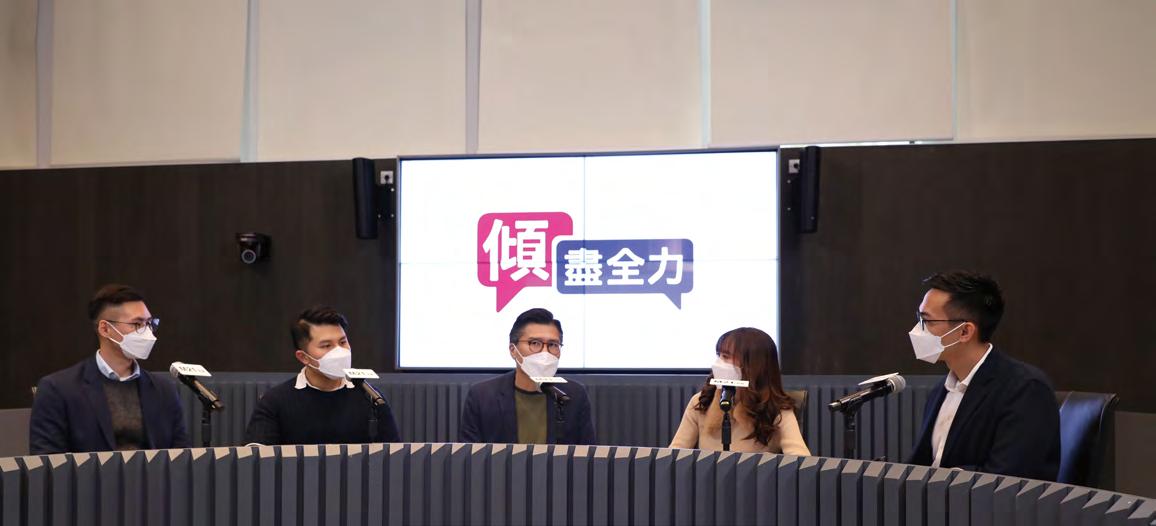
At the same time, only limited governmental services accept e-payments, reflecting its low efficiency and failure to keep up with the e-payment trend. The young professionals suggested that the Government should proactively negotiate with e-payment service providers for flexible fees, remove the minimum charge per transaction fee for small shop merchants, and subsidise a one-off installation fee.
They also believe that it is important for the Government to take an active role in creating a snowball effect to form a new consumer habit and lead to the provision of electronic payment to all merchants. For example, in the case of the catering and retail industries, the Government may require shops to provide e-payment platforms in their leases. In addition, e-payment methods should also be introduced for more services like online booking of recreational and sports facilities, and payment of driving licenses and applications by various departments.
In view of the development opportunities in the GBA, the young professionals suggested that the financial institutions should introduce e-wallets for travellers to
use different electronic currencies in the GBA cities, so as to continue to expand financial interconnection among GBA cities. On the other hand, they believe that Hong Kong can leverage its advantages as a springboard for enterprises in the GBA to enter the international market. Most of the payment systems in Hong Kong are integrated with a number of local, mainland, and international e-payment systems, including credit cards, digital wallets, and other e-payment tools. Such comprehensiveness can help enterprises in GBA to break into the international market more easily.
The three young professionals also observed that the public is concerned about the cyber security issues arising from e-payments and the need to protect users. In addition, they called for the interoperability between Hong Kong and mainland China’s regulation on e-payment and technological innovations, such as the ability of Hong Kong e-payment systems to authenticate identity cards from mainland China to open accounts, which will bring a closer connection between the cities of the GBA and help people enjoy the convenience of e-payments.
This project is part of the Stepping Forward with Commitment to Hong Kong initiative. The Stepping Forward with Commitment to Hong Kong initiative was launched in the Federation in June 2022, with the aim of garnering participation from more than 20,000 youth on “community building”, “economic development” and “Greater Bay Area development” to work in unison to create a new era for Hong Kong. “With All Our Might!”
is one of the focus projects of Stepping Forward with Commitment to Hong Kong. Five thematic episodes have been scheduled for release. To watch the programme, please visit the website m21.hk.

“With All Our Might!” 《傾.盡全力》web series
500 young people hopped on the high-speed train from Hong Kong to mainland China, celebrating the restart of cultural exchange after a three-year hiatus from COVID-19.
500 young people participated in the Youth High Speed Rail Trip ( 高鐵青年號 ), jointly organised by The Dragon Foundation ( 龍傳基金 ) and the Federation. The participants included secondary school students, university and college students, and young professionals, who boarded the train from Hong Kong West Kowloon Station to Guangzhou.
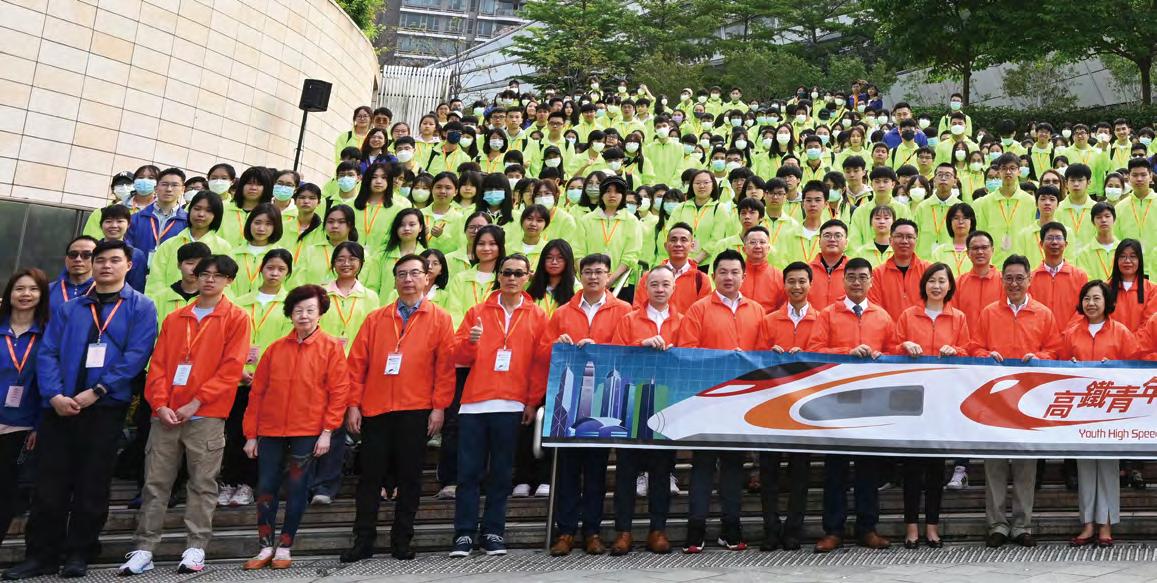
The two-day trip kicked off with a high-speed railway ride that only took an hour, followed by an itinerary entailing insights into innovative developments of the Greater Bay Area’s technological, ecological, historical, and scientific backgrounds, as well as learning more about the Cantonese culture in Guangdong.
Nina, a Form 5 student said it was her first time taking the high-speed railway, and she thought the ride was fun and exciting. “The train arrived at Guangzhou South Station really fast. I was just having snacks and chatting with friends, and before we knew it, we had reached our destination!”
Nina’s friend Joey, who joined in for the trip, also shared similar sentiments. “This is the first trip I have had in three years. I treasure the opportunity to go on this trip with my classmates as I will be busy with the public exams next year.”
Visits to high-tech enterprises such as the WeChat Headquarters, Nanhua Instruments Co., Ltd., and GDXL Precise Machinery Co., Ltd were part of the itinerary’s other highlights. Joey added, “Many of these companies are rarely open to the public, but this tour gave us a rare glimpse into the private working space of the enterprises!” Nina appreciated the hospitality received from these enterprises. “The onboarding tour and experience from these enterprises were very detailed. There was much to see and do, and I am elated to have had such a wonderful journey."
Cheung Kit, who is currently studying in Form 3 and is interested in pursuing a career in the technology industry, was looking forward to visiting high-tech enterprises, especially in finding out more of the job opportunities in
the Greater Bay Area. In just two days, he visited Li Jiao Water Purification Plant, Nanhai Hydrogen Centre, Horizon New Energy Technologies, and Bright Dream Robotics. Cheung Kit said he had never imagined that the water purification plant would be so beautiful and appreciated that they are using the purified water to maintain the ecology of nature, thus creating a robust green sustainable cycle.
Cheung Kit was also most impressed by the visit to a hydrogen company, “It was a great opportunity to witness the development of science and technology in our country! It has indeed broadened my horizon by gaining more in-depth knowledge with an onsite visit instead of just accessing the basic information on the Internet usually.”
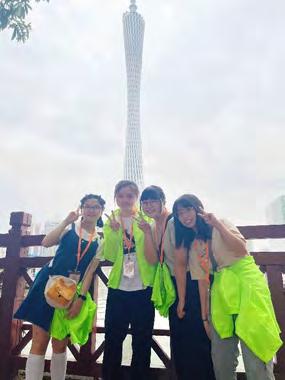
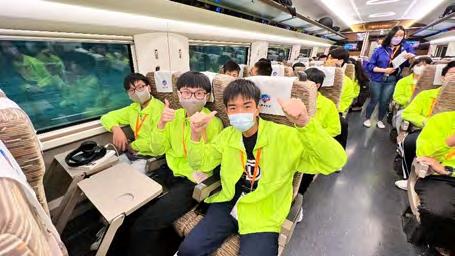
Organised by The Dragon Foundation and the Federation, with full support from the MTR Corporation, the Department of Youth Affairs the Liaison Office of the Central Government in Hong Kong, the Guangdong Overseas Friendship Association and the Guangdong Youth Federation, the "Youth High Speed Rail Trip" is in line with the theme of "A Million Youth Seeing China". 500 young people were divided into six groups to experience advanced 3D printing technology, intelligent construction robots, self-driving technology, hydrogen energy technology, innovative sewage, and solid waste management technologies. Visits to the Creative Park, Guangzhou Meteosat Ground Station, and Nanfeng Kiln are conducted to elaborate more about the construction of the highspeed rail network and to explore the innovative technology development in Guangzhou and Foshan in the Greater Bay Area. For more information, please visit dragonfoundation.net.
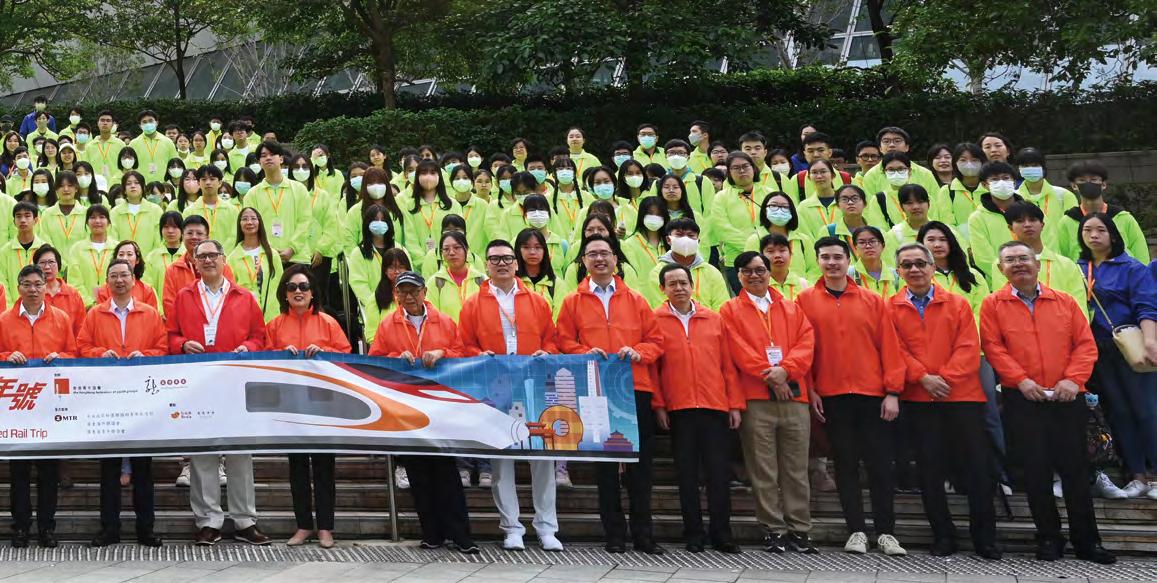 Nina (second from left) and Joey (second from right) took a tour of Guangzhou, including the famous Huacheng Square and Haixinsha, where they took pictures in front of the Guangzhou Tower, known as the " Slim Waist ".
Nina (second from left) and Joey (second from right) took a tour of Guangzhou, including the famous Huacheng Square and Haixinsha, where they took pictures in front of the Guangzhou Tower, known as the " Slim Waist ".










































































ong Kong Student Science Project Competition (HKSSPC) was successfully held on 22
nd 23 April. mission to heighten students’ scientific literacy and pique their interest in science through various investigative activities, aiming to nurture future talents in innovation and technology.
195 teams from various secondary schools in Hong Kong vied for the top prize at the HKSSPC this year, jointly organised by the Education Bureau, the Federation, and the Hong Kong Science Museum. The competition has nurtured over 16,000 secondary school students since its inception in 1998.
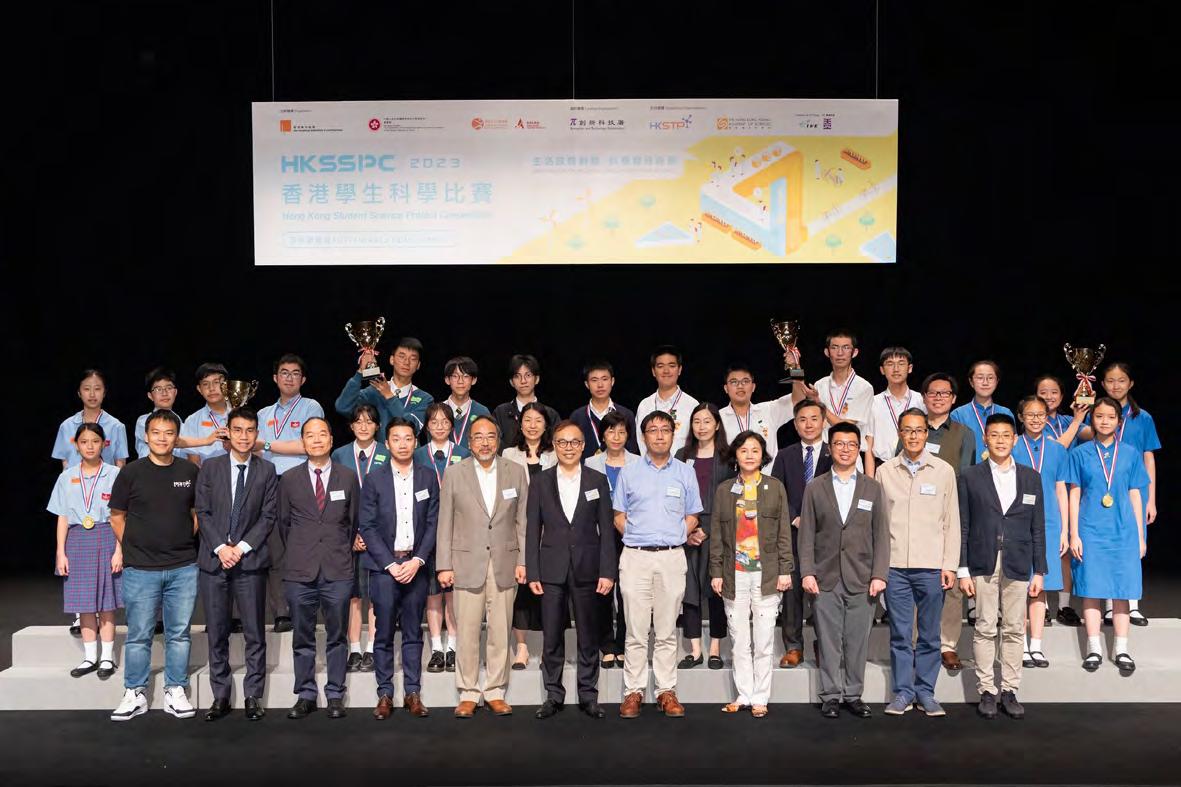
The theme of this year's competition was Creativity Inspired by Life – Innovation through Science. This 25th edition encourages students to explore science and technology and promote innovation through creative thinking along the lines of sustainable development.
Hong Kong remains a significant bridge to be developing as one of the high calibre cities within the Greater Bay Area (GBA), as China announced its 14th Five-Year Plan in 2021 for national economic and social development and the long-range objective through 2035.
To reinforce and enhance Hong Kong’s competitive advantage in being the international innovation and technology hub in the GBA, it is the Federation’s
Four teams among 20 finalists were crowned with their inventions this year, with two each from the junior and senior divisions.
For the junior division, the team from the Chinese Foundation Secondary School won the Invention Award for their project named Upcycling of Abandoned Beehives! ( 走塑 ‧ 蠟「唧」行動 ), while the team from the Heep Yunn School won the Investigation Award for the project entitled SeaUVeed Success ( 藻傳秘方 ).
For the senior division, the team from Lau Wong Fat Secondary School (LKWFSL) won the Invention Award for the project, A Transparent and Biodegradable Mask Filter ( 新型可生物分解濾芯 ), while the team from the King’s College won the Invention Award for the project, AgNPs and natural dye-sensitised TiO2 NPs-catalysed photo-oxidation in food waste treatment and its potential application in H2 production enhanced by Venturi effect ( 化廢為寶鈦容易 ).
TheHong Kong Student Science Project Competition (HKSSPC) encourages students to explore science and technology and promote innovation through creative thinking.
Cheung Ka Yu, the team leader, and Oscar Fung King Ho, the team member of Lau Wong Fat Secondary School’s (LKWFSL) award-winning project, A Transparent and Biodegradable Mask Filter ( 新型可生物分解濾
芯 ) shared that this is the first large-scale science project competition that they have participated in. The Award has further motivated them to progress further in exploring other science projects.
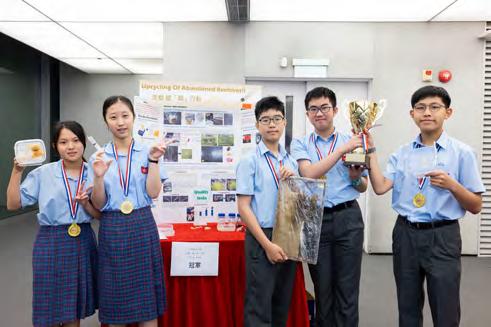
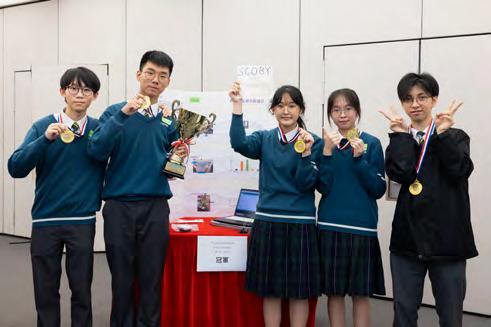

Ka Yu’s team managed to use organic materials, such as kombucha, sugar, and green tea, to make a bio-degradable mask aimed to provide construction workers with a comfortable and efficient filter to avoid volatile organic compounds and a large amount of particulate matter (PM) they encounter during construction work.
Oscar who was responsible for journaling and experiment design during the Competition, said that using organic ingredients to make the masks came during the pandemic when there was a mask shortage in Hong Kong.
“That was when masks ran out everywhere, and some people thought of the idea of making masks themselves. So we started to explore the possibility of using organic ingredients. Our SCOBY (symbiotic culture of bacteria and yeast) filter works better than homemade materials like kitchen napkins. It shows its potential of filtering air pollutants and preventing construction workers from inhaling toxic elements like formaldehyde,” Oscar said.
“There were times during the Contest when we kept failing to get the correct data we need to move the project forward. The thoughts of giving up did come to us, but we still made it eventually. Kudos to our teammates who continued to look for references and information online to solve the issues despite feeling frustrated,” Kay Yu added.
Oscar thanked HKSSPC for the opportunity to exchange ideas with other contestants on different science projects.
“I remembered that moment when the judges announced our award. We were very nervous awaiting the results, but once we heard that we won, the contestant team who sat next to us was even more excited than us! That’s when it hit me that this is not just a competition., It also nurtures an awesome community for science lovers to share our thoughts and celebrate one another’s ideas,” Oscar revealed.
Chan Shun Chit, the team leader of the Chinese Foundation Secondary School’s award-winning project Upcycling of Abandoned Beehives! ( 走塑
動 ) said the award boosted his and his team’s confidence in using biotechnology to protect Mother Earth better.
Shun Chit and his team had to use melted abandoned beehives and other organic materials like coffee grounds, soybean grounds, and rosin and to make alternative fillers for 3D printing.
“We wanted to make this biodegradable beeswax 3D filament as a little something to save our world from global warming.
Winning this Award gives us more momentum to protect our environment using science,” Shun Chit said.
Spending his free time watching documentaries about nature and hiking to study different plants and animals, Shun Chit dreams of working in the biotechnology field.
“Through these documentaries about nature, I was sad to learn that there are so many species that are now extinct because they can’t be compatible with the living patterns of humankind. I wish I could work in the biotechnology field in the future and use cloning technology to bring those
The Federation's Summer Youth Programme 2023 is the perfect opportunity for young people to unlock their potential, making new friends, and pushing their boundaries. With over 6,000 activities across three categories –outdoors, future skills, and leisure, cultural, and sports – there’s something for everyone. Young people can look forward to joining in water or other team sports, a wild camp, drama groups or art workshops. They can even learn how to become a dubbing artist or an esports player. Unlock hidden passion and potential with our extensive line-up planned!

Programme Reference number: TP-S23-703
Programme Duration: 20/07/2023 - 24/08/2023
Programme Date: 15:30-16:30
Activities offerings: Professional recording engineers will teach basic voice-over techniques and guide you through voicing your favourite characters in cartoons or movies.
Suitable Ages: 15-24 years old
Fees: 600 HKD for members, 630 HKD for non-members
Organising Unit: Tai Po Youth S.P.O.T. (2 Po Heung St, Tai Po)
Contact: 2656 3257
Programme Reference number: TKO-S23-139
Programme Duration: 24/07/2023 - 28/08/2023
Programme Date: Every Monday 18:00-19:30
Activities offerings: If you are passionate about the e-Sports industry, we invite you to join us and experience this! You will be taught by professional instructors, from event design to e-Sports contest planning. Join us and practice e-Sports with professionals!
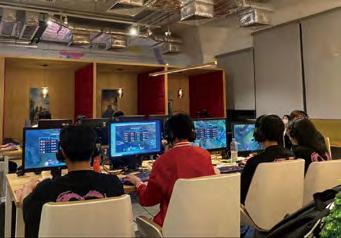
Suitable Ages: 12-24 years old
Fees: 200 HKD for members, 230 HKD for non-members
Organising Unit: Jockey Club Tseung Kwan O Youth S.P.O.T. (G/F, Ming Tak Estate Ming Kok House, Hang Hau )
Contact: 2623 3121
Programme Reference number: CHW-S23-244
Programme Duration: 18/07/2023 - 22/08/2023
Programme Date: Every Tuesday 20:00-21:00
Activities offerings: Through drama acting practice, young people can enhance their self-confidence and memory, and grow their empathy by taking on different roles. Through thinking from different perspectives, the programme will help relieve the mental burden on young people and foster more positive energy.
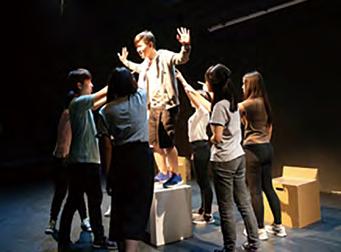
Suitable Ages: 12-24 years old
Fees: 300 HKD for members, 330 for non-members
Organising Unit: Jockey Club Cheung Wah Youth S.P.O.T. (Room 317-332, Cheung Wah Estate Cheung Lai House, Fanling)
Contact: 2669 9111
For online membership registration and summer programmes’ registration, please go to https://easymember.hk/
The HKFYG has striven to train the younger generation with English and communication skills through the English Public Speaking Contest. For the past two decades.
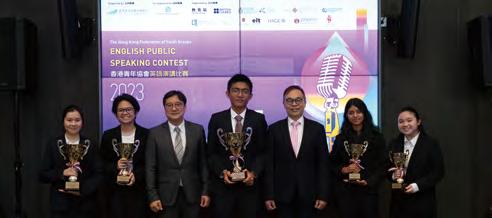
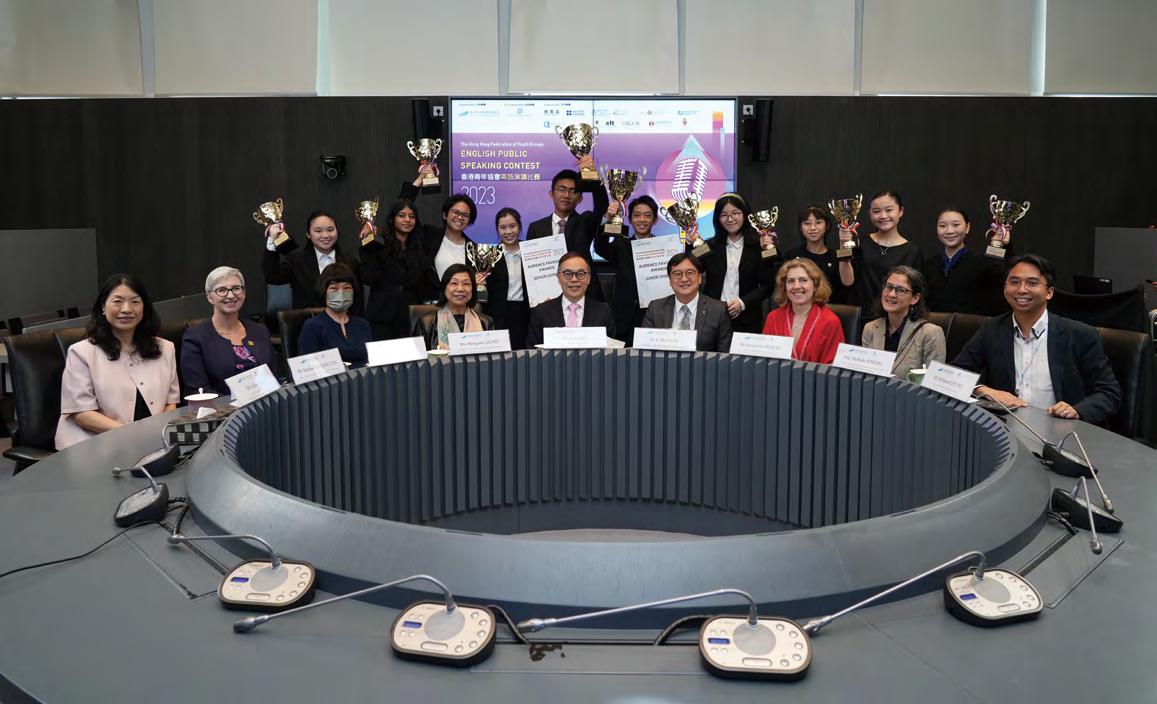
Stick to what you truly believe in, and you won't go astray.
English enables connections, which we learn to appreciate even more during the pandemic. Whether it is working on international projects, reading social media posts from global communities, or travelling in a foreign country, English helps bring the world closer.
The HKFYG strives to train the young generation with English and communications skills, and this year is no exception. Organised by The HKFYG Leadership Institute and co-organised by The English-Speaking Union Hong Kong, the HKFYG English Public Speaking Contest ended on a high with its Grand Finals and Awards Ceremony being held as part of its 20th anniversary celebrations. The Contest saw 2,040 participants from 167 local schools, marking a record high in recent five years.
The champion and final audience awards went to Cheng Wai Ho from Senior Division and Joshua So Chun Him from Junior Division.
Wai Ho, a high school student from the Queen’s College, shared his passion for English public speaking and what attributed him to win the championship: “My passion for English public speaking was probably sparked when I
joined my primary school’s debate team back in 2017. My first public speaking presentation was at my school about baseball statistics, so anything as trivial as that can be a great starting point as long as you believe passionately and really care about the topic you've chosen. So believe in yourself.”
According to EF Education First’s report in 2022, Hong Kong ranked 31st globally and fourth in English proficiency in Asia last year, making it a city with “High English Proficiency”. As the HKSAR government stated that Hong Kong people must maintain excellent English proficiency to secure Hong Kong’s status as a metropolis, the Federation has been dedicated to promoting English public speaking activities to boost students’ confidence in speaking English.
The HKFYG Leadership Institute believes communication skills are key for personal development and serving society. The more eloquently one speaks in English, the more opportunities one gets in the global arena.
Joshua, a middle school student from the St. Paul’s College said this is his third time joining the Contest and he has learned a lot about how to deliver his ideas confidently throughout the English Speech Competition.
Joshua managed to overcome this hurdle during the Contest this time, and he would like to advise others who share the same passion for English public speaking as him to have more faith in themselves.
“Pretend to be confident first, and hide your insecurity and worries in front of your audiences, so that they can be more engaged in what you are going to share,” Joshua concluded laughingly.
Wai Ho, who was too nervous to sleep the night before the grand finals said what led him to the crown was his authenticity and genuineness.
One crucial skill Joshua learned about public speaking from other contestants is how to make a package of his content and provide a hook at the very beginning for audiences to get them interested in his speech. When asked how he felt at the Contest as a third-time joiner, Joshua appreciated the challenges during the Contest and said that it had sharpened his skill of spontaneity.
“During the first two times of joining the Contest, I wasn’t anxious during preliminary rounds because I gave a speech in recorded format. I could try as many times as I wanted. But I struggled with anxiety during district finals, where I needed to give speeches in person.”
Joshua added, “I didn’t have enough time to rehearse the speech, and I used lots of filler words like ‘umms’ because I was too nervous. Judges saw through my anxiety and insecurity, but that made sense. I wasn’t even convinced by my speech, of course, judges wouldn’t believe in it.”
“During the tournament, I made speeches about how young people in Hong Kong could find their sense of identity during the pandemic, and how to push for more international cooperation between Hong Kong and other regions for more social progress. These are the topics that really appealed to me and also truly represented who I am,” he added.
Reflecting on his experiences, Wai Ho encouraged his peers to step out of their comfort zones to deliver their ideas to the world. He said having a fancy or a glamorous platform to give a speech is never the key to success as a public speaker.
“You could just shout it from the mountaintops or just talk to more people and engage yourself with thinking about social issues and whatever you feel passionate about. It doesn't have to be world hunger or poverty or anything as massive as that,” Wai Ho advised. “Stick to what you truly believe in, and you won't go astray.”
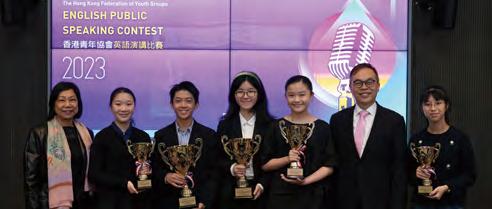
The HKFYG English Public Speaking Contest is an annual English public speaking competition organised by The HKFYG Leadership Institute with the objectives of grooming youth with communication, dialogue, and negotiation skills. Since its launch in 2004, the Contest has been widely supported by over 400 secondary schools in Hong Kong, and the accumulated number of participants has reached over 27,000.
The HKFYG Leadership Institute is dedicated to creating a new generation of leaders for Hong Kong; 200,000 have been trained since 2000. The home of the HKFYG Leadership Institute is the historic former Fanling Magistracy, revitalised under the Batch III of Revitalising Historic Buildings Through Partnership Scheme. It combines the heritage of a graceful colonial building, opened in 1961, with immersive and interactive technology. Young people will be engaged and involved in high-quality programmes, intercultural exchanges, and hands-on experiences, especially in Sustainability Leadership, Service Leadership, Resilient Leadership, and Communication and Collaboration to enhance their intellect, responsibility, and service locally, nationally, and globally. For more details, please visit leadershipinstitute.hk.

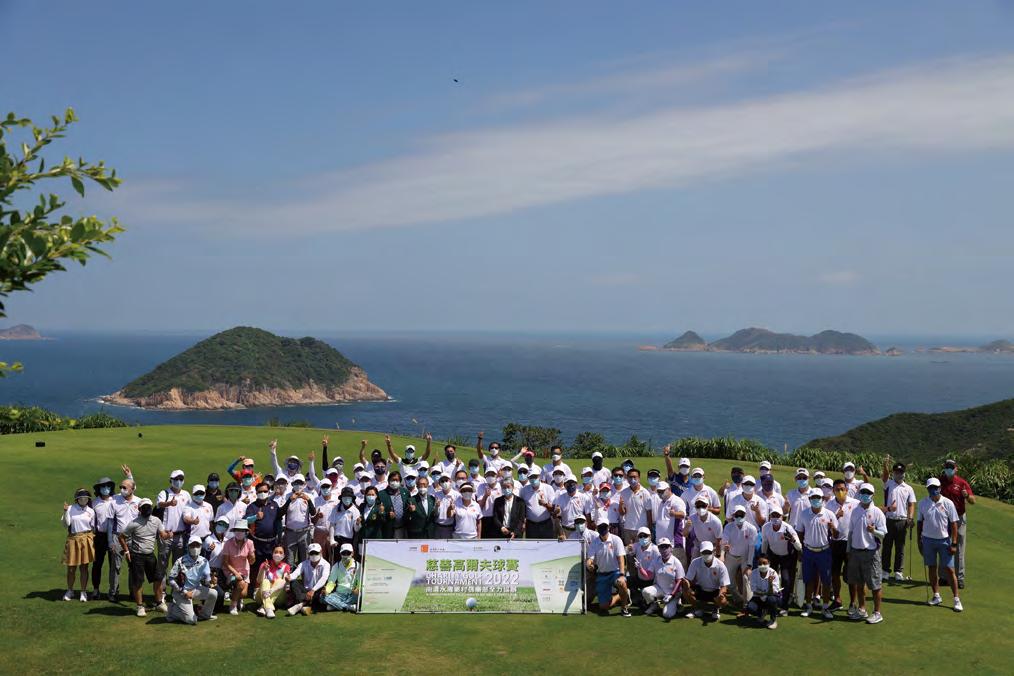


HKFYG Website: hkfyg.org.hk
M21 Multimedia Web: M21.hk
Student Guidance Team (Kindergarten) 2395 0162 sgt@hkfyg.org.hk
Media Counselling Centre 2788 3433 mcc@hkfyg.org.hk
Media Counselling Centre (Youthline) 2777 8899
Media Counselling Centre (Open Up) Website: www.openup.hk
Media Counselling Centre (uTouch) 2788 3444 utouch@hkfyg.org.hk
Education Services
Education Services Unit 3755 7107 education@hkfyg.org.hk
Ching Lok Kindergarten/ Ching Lok Nursery
Ching Lok Kindergarten (Yaumatei) / Ching Lok Nursery (Yaumatei)
KK Cheng Kindergarten
2886 8856 cl-swh@hkfyg.org.hk
2385 6868 cl-ymt@hkfyg.org.hk
2385 2622 kkc@hkfyg.org.hk
Lee Shau Kee Primary School 2448 1011 lskps@hkfyg.org.hk
Lee Shau Kee College
2146 1128 hlc@hlc.edu.hk
Continuous Learning Centre 2130 4000 clc@hkfyg.org.hk
Living Life Academy 2130 4000 lla@hkfyg.org.hk
Parenting Services
Parent Support Network
2402 9230 psn@hkfyg.org.hk
Family Life Education Unit (Eastern/Wanchai District) 2567 5730 psn-ew@hkfyg.org.hk
Family Life Education Unit (Kowloon City District)
2774 3083 psn-knc@hkfyg.org.hk
Jockey
Jockey
Jockey
Family Life Education Unit (Tai Po/North District)
Family Life Education Unit (Tsuen Wan/Kwai Tsing District)
2658 3097 psn-tpn@hkfyg.org.hk
2490 2662 psn-twkt@hkfyg.org.hk
Creativity Education and Youth Exchange
Creative Education Unit
2561 6149 ce@hkfyg.org.hk
Centre for Creative Science and Technology 2561 6149 ce@hkfyg.org.hk
Youth Exchange Unit
3586 8448 ye@hkfyg.org.hk
Mainland Affairs Office 3705 1501 mao@hkfyg.org.hk
Zhongshan Sanxiang Youth Training Centre 3586 8448 ye@hkfyg.org.hk
Leisure, Cultural & Sports Services
Cultural Services Unit 2395 5753 csu@hkfyg.org.hk
Community Team Sports Office 3611 6670 cts@hkfyg.org.hk
Tsuen Wan Indoor Sports Centre 2413 6669 twisc@hkfyg.org.hk
Camps Unit 2395 5759 camp@hkfyg.org.hk
Jockey Club Sai Kung Outdoor Training Camp 2792 2727 otc@hkfyg.org.hk
Lamma Youth Camp 2982 1929 lyc@hkfyg.org.hk
Stanley Outdoor Training Camp 2813 8886 s@hkfyg.org.hk
Tai Mei Tuk Outdoor Activities Centre 2664 4686 tmt@hkfyg.org.hk
The HKFYG Leadership Institute – Lodge 2169 0255 info@leadershipinstitute.hk
Research and Publications
Youth Research Centre 3755 7022 yr@hkfyg.org.hk
Professional Publications Unit 3755 7108 cps@hkfyg.org.hk
Special Services
The HKFYG Youth Hostel PH2 2656 0009 ph2@hkfyg.org.hk
WL Residence 2915 5532 wlr@hkfyg.org.hk
Café 21 3188 5792 cafe21@hkfyg.org.hk
PH3 5933 6323 ph3@hkfyg.org.hk
Organic Farm 2838 4808 organicfarm@hkfyg.org.hk
Hydroponic Farm 9333 2551 hf@hkfyg.org.hk
The Dragon Foundation Secretariat 2811 2779 info@dragonfoundation.net
Development and Support Partnership and Resource Development Office
Corporate Planning and Staff Training Unit
3755 7103 partnership@hkfyg.org.hk
3755 7088 td@hkfyg.org.hk ; cp@hkfyg.org.hk
Corporate Communications Office 3755 7022 cco@hkfyg.org.hk
Sustainability Unit 3755 7110 sst@hkfyg.org.hk
User Experience Unit 3905 1546 ue@hkfyg.org.hk
HKFYG Building Management Unit 3755 7098 bm@hkfyg.org.hk
hkfygsotc hkfygsotc
Publisher : The Hong Kong Federation of Youth Groups 香港青年協會 hkfyg.org.hk.m21.hk
Youth Hong Kong: 21/F, The Hong Kong Federation of Youth Groups Building, 21 Pak Fuk Road, North Point, Hong Kong Tel : 3755 7097.3755 7108.Fax : 3755 7155

.Email : youthhongkong@hkfyg.org.hk.Website : youthhongkong.hkfyg.org.hk
The title of this journal in Chinese is Xiang Gang Qing Nian 香港青年
Soy-ink is made from soybeans and is both environmentally friendly and sustainable. Soy-ink is biodegradable and non-toxic.